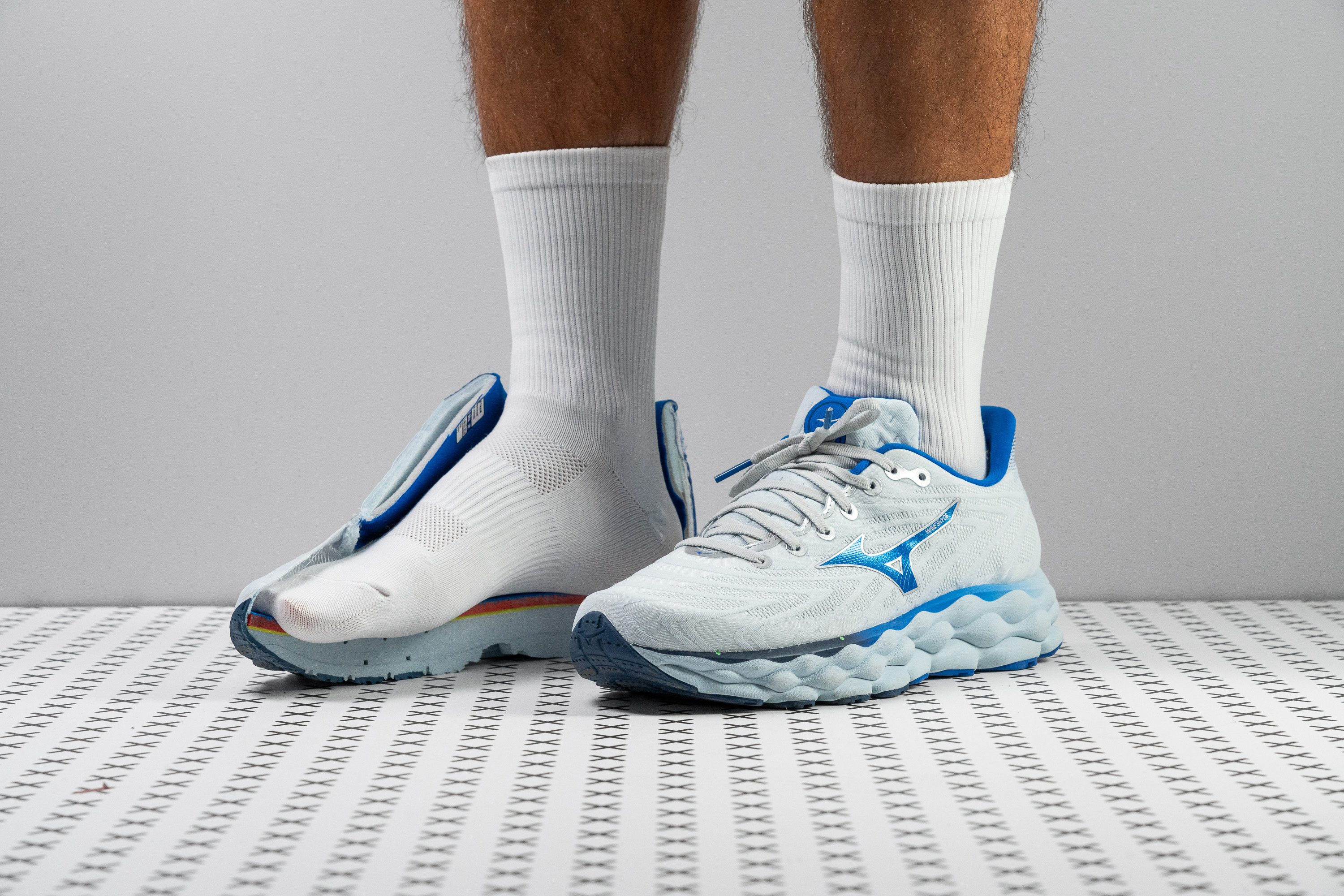Our verdict
Pros
- Reduced weight from v7
- Softer midsole
- All-around comfort
- Ideal for long-distance runs
- Perfect for heel strikers
- Maximalist yet lightweight design
- High-quality upper
- Great for winter
Cons
- Needs better breathability
- Not very stable
- Outsole lacks durability and grip
- Price may deter some
Audience verdict
- Top 8% in road running shoes
- Top 10% in Mizuno running shoes
Comparison
The most similar running shoes compared
+ + Add a shoe | |||||
|---|---|---|---|---|---|
| Audience score | 91 Superb! | 90 Superb! | 84 Good! | 88 Great! | |
| Price | $170 | $180 | $160 | $180 | |
| Pace | Daily running | Daily running | Daily running | Daily running | |
| Shock absorption | High | Moderate | Moderate | High | |
| Energy return | Moderate | High | Low | Low | |
| Traction | Moderate | High | High | High | |
| Arch support | Neutral | Neutral | Neutral | Neutral | |
| Weight lab Weight brand | 9.6 oz / 271g 9.8 oz / 277g | 10.3 oz / 292g 11.4 oz / 323g | 9.1 oz / 257g 10 oz / 283g | 10.4 oz / 295g 0.4 oz / 10g | |
| Drop lab Drop brand | 10.0 mm 8.0 mm | 10.6 mm 10.0 mm | 10.5 mm 10.0 mm | 6.2 mm 6.0 mm | |
| Strike pattern | HeelMid/forefoot | Heel | Heel | Mid/forefoot | |
| Size | True to size | True to size | True to size | - | |
| Midsole softness | Soft | Soft | Balanced | Soft | |
| Difference in midsole softness in cold | Normal | Small | Normal | Small | |
| Toebox durability | Good | Decent | Decent | Good | |
| Heel padding durability | Good | Good | Decent | Good | |
| Outsole durability | Bad | Good | Good | Decent | |
| Breathability | Moderate | Breathable | Warm | Moderate | |
| Width / fit | Medium | Wide | Medium | Medium | |
| Toebox width | Medium | Wide | Medium | Narrow | |
| Stiffness | Moderate | Stiff | Moderate | Stiff | |
| Torsional rigidity | Moderate | Stiff | Moderate | Stiff | |
| Heel counter stiffness | Moderate | Moderate | Moderate | Stiff | |
| Heel lab Heel brand | 40.7 mm 42.0 mm | 35.2 mm 39.0 mm | 36.9 mm 38.0 mm | 44.3 mm 44.0 mm | |
| Forefoot lab Forefoot brand | 30.7 mm 34.0 mm | 24.6 mm 29.0 mm | 26.4 mm 28.0 mm | 38.1 mm 38.0 mm | |
| Widths available | NormalWide | Normal | Normal | NormalWide | |
| Orthotic friendly | ✓ | ✓ | ✓ | ✓ | |
| Season | All seasons | SummerAll seasons | All seasons | All seasons | |
| Removable insole | ✓ | ✓ | ✓ | ✓ | |
| Ranking | #43 Top 7% | #51 Top 14% | #240 Bottom 37% | #140 Top 37% | |
| Popularity | #340 Top 50% | #199 Bottom 48% | #174 Top 46% | #195 Bottom 49% |
Who should buy
After evaluating the Mizuno Wave Sky 8 in our lab, we believe it’s:
- Perfect for neutral runners seeking a high-quality daily trainer that offers a premium feel and a plush ride.
- An excellent choice for marathoners—especially those in colder climates—who desire endless cushioning for long runs.
- A solid upgrade for fans of the previous Wave Sky models, as it significantly enhances the features of its predecessor while keeping its signature look and feel.
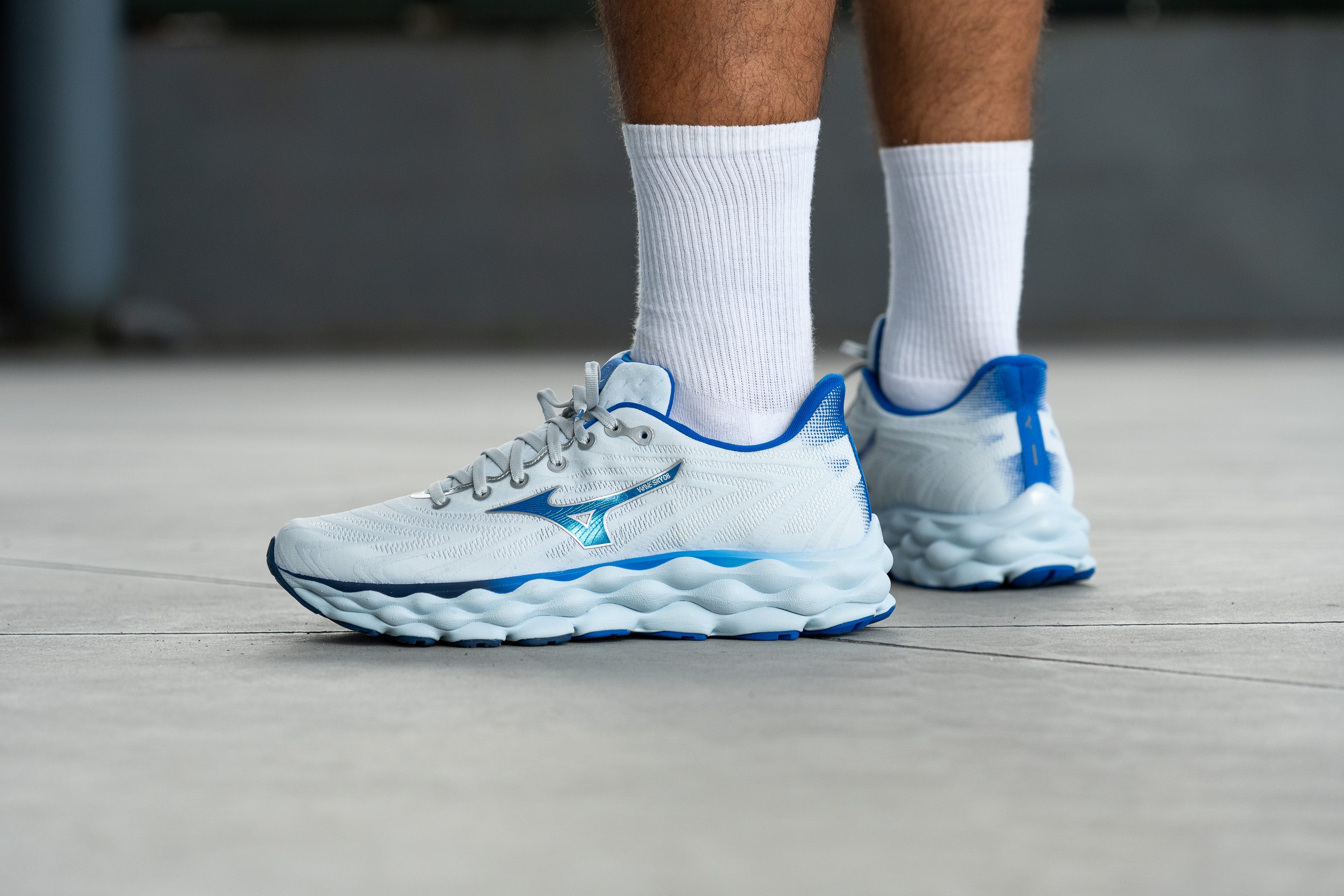
Who should NOT buy
If there's a drawback to the Wave Sky 8, it’s stability—its towering design lacks dedicated support, making it ideal only for neutral runners. From our testing, we feel it's not the go-to for anyone seeking a stable ride despite its premium features. If stability and maximum cushioning are what you're after, you might want to explore the ASICS Superblast 2 or the New Balance Fresh Foam More v5.
Concerning price, the Mizuno Wave Sky 8 approaches the $200 mark, which could stretch some budgets. We believe there are more wallet-friendly alternatives that don't sacrifice comfort or performance. For instance, the ASICS Novablast 4 provides similar plush cushioning at a more reasonable price.
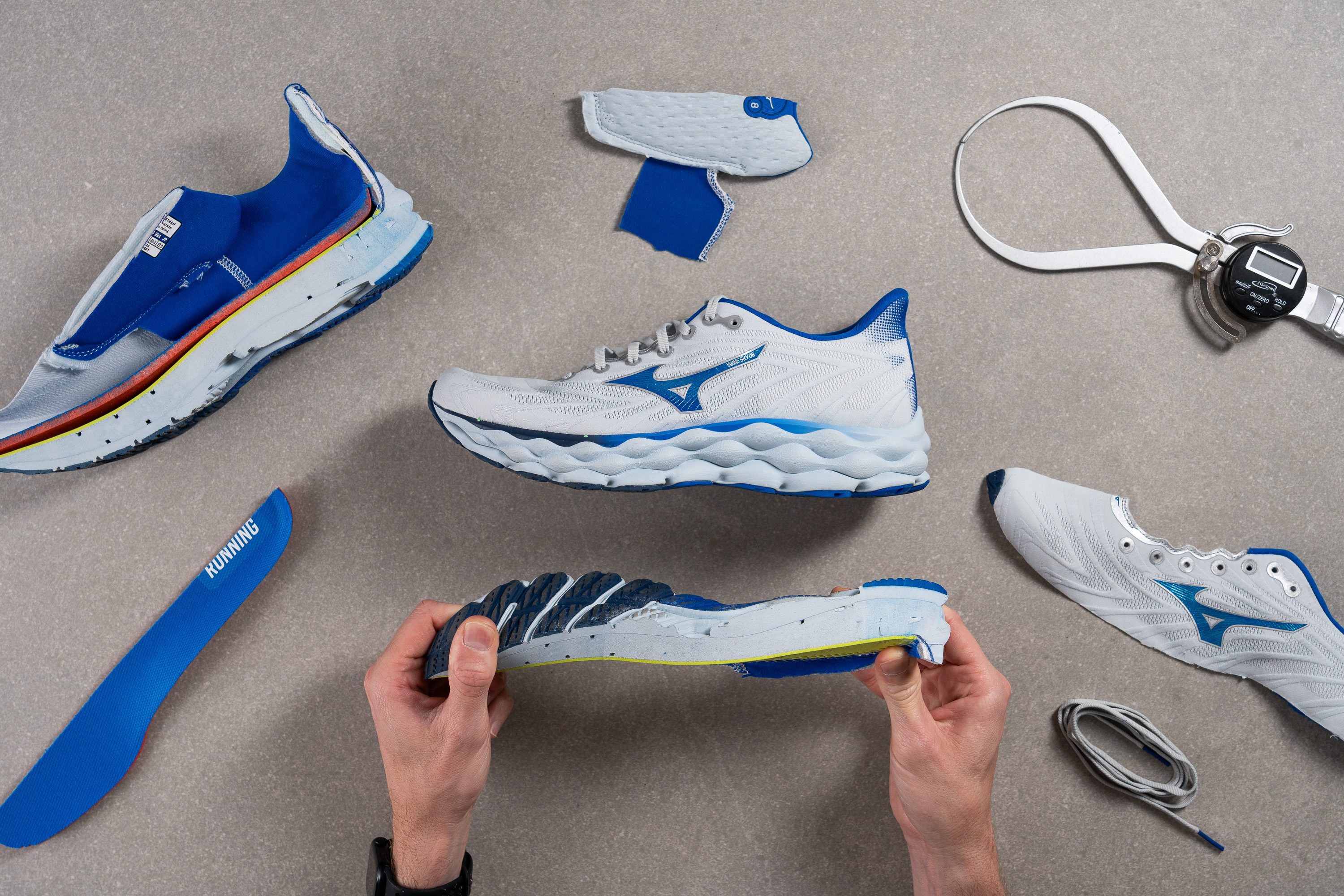
Cushioning
Shock absorption
The Wave Sky 8’s midsole looks ultra-cushioned, and our lab results confirm it. With 141 SA, it delivers a true pillow-like ride that’s perfect for runners seeking maximum impact dampening or a dedicated long-run shoe.
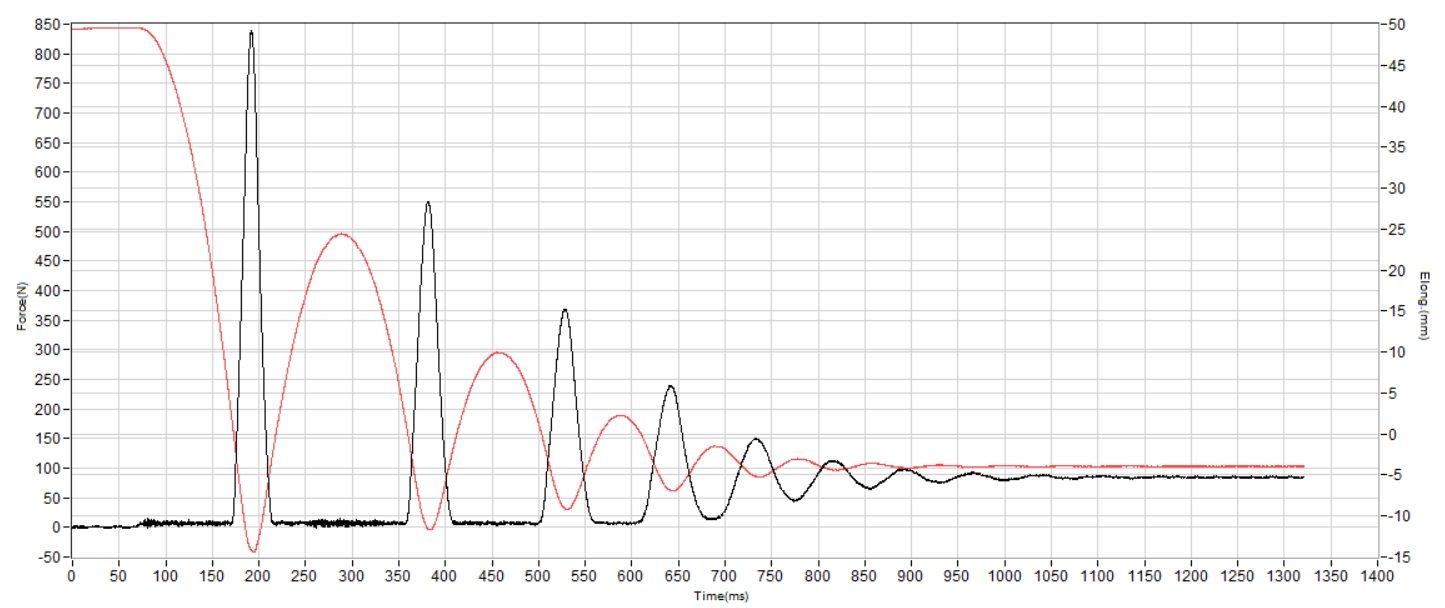
| Wave Sky 8 | 141 SA |
| Average | 130 SA |
Energy return
We also tested energy return and got a decent result of 56.5%. It’s not outstanding—actually below most maximalist competitors—but for runners not focused on performance, it’s still acceptable since it clears the 50% mark.
| Wave Sky 8 | 56.5% |
| Average | 58.6% |
Heel stack
The Wave Sky 8 epitomizes the maximalist running shoe design. Boasting a heel stack of 40.7 mm—slightly above the 40-mm threshold—it guarantees that every heel striker, regardless of weight, will experience ample cushioning in this key area.
Could this be excessive? For those who favor a more nimble shoe, we believe it might indeed be overkill. If that's you, opting for a less cushioned model like the Nike Vomero 17, with its 33.9 mm stack, could be a more suitable choice.
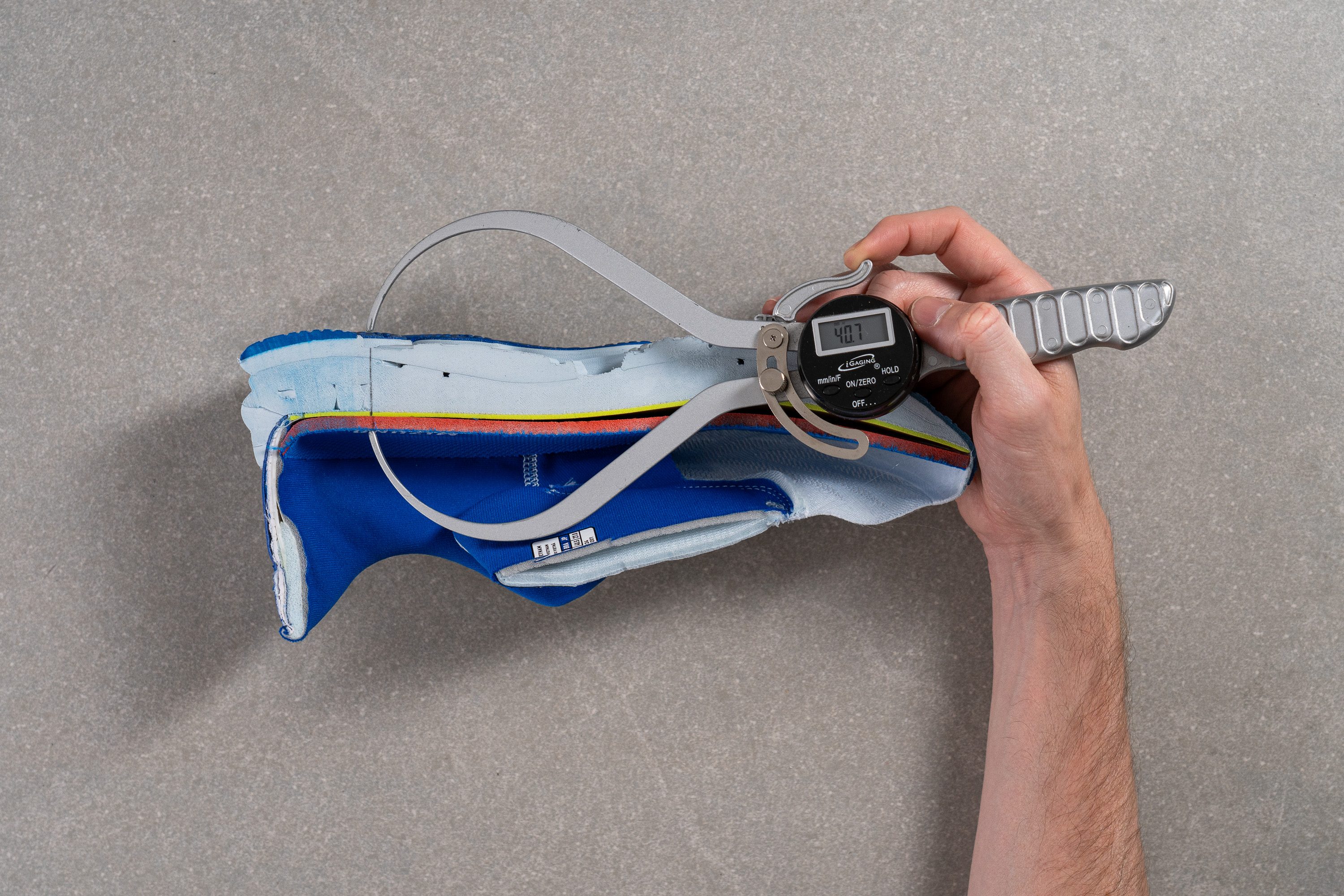
| Wave Sky 8 | 40.7 mm |
| Average | 34.8 mm |
Forefoot stack
Even with a midfoot-to-forefoot strike, the shoe consistently kept bouncing back, even at higher speeds. This is due to the forefoot's substantial cushioning of 30.7 mm, which makes it perfect for those extended, long-distance runs that are the staple workout of every marathoner.
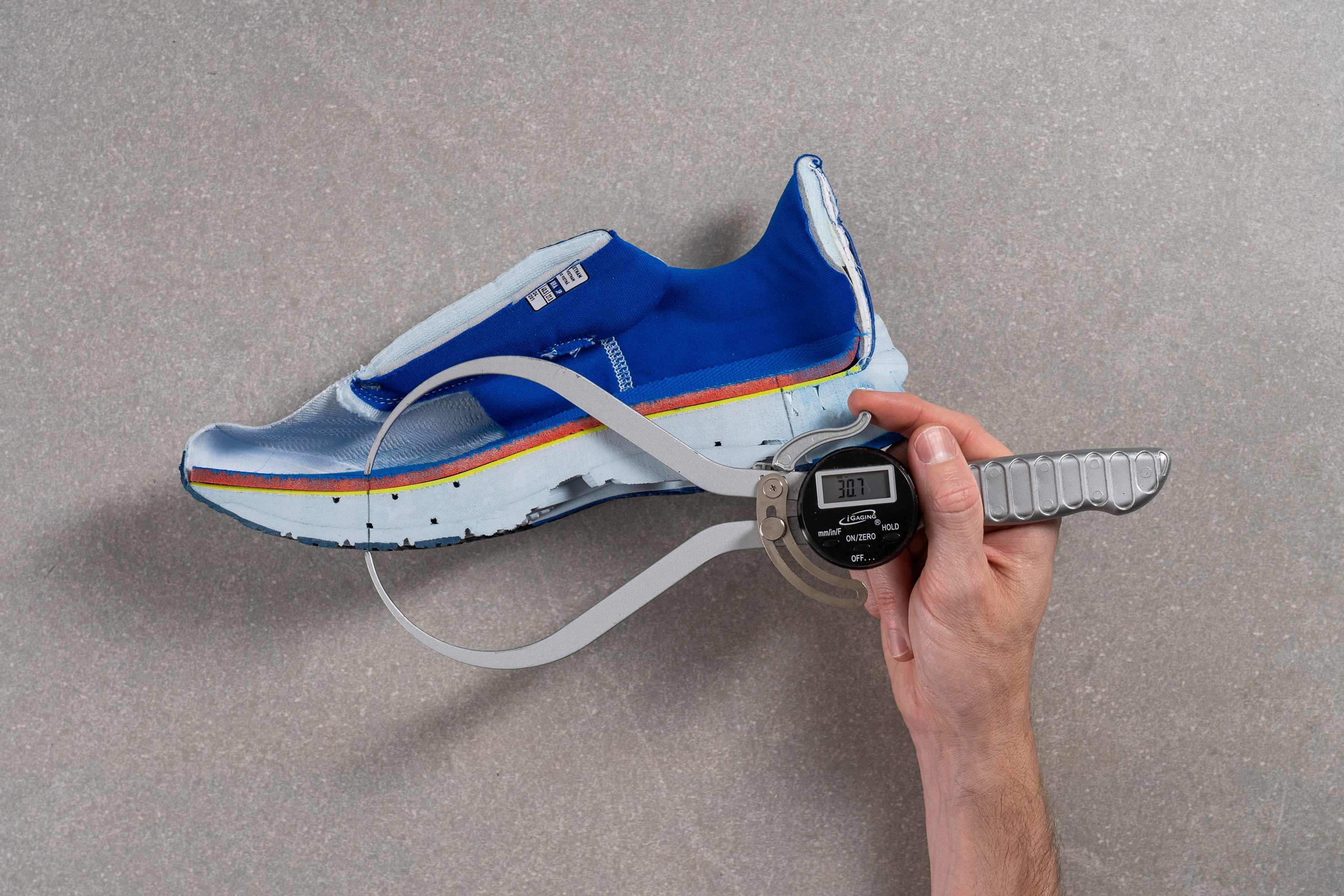
| Wave Sky 8 | 30.7 mm |
| Average | 26.2 mm |
Drop
We found that the WS8 has a 10-mm offset between the heel and forefoot.
This higher drop is particularly beneficial for heel strikers but also accommodates various types of runners. In our experience, it's especially helpful for those experiencing calf or Achilles tendon issues, as the increased drop can provide much-needed relief.
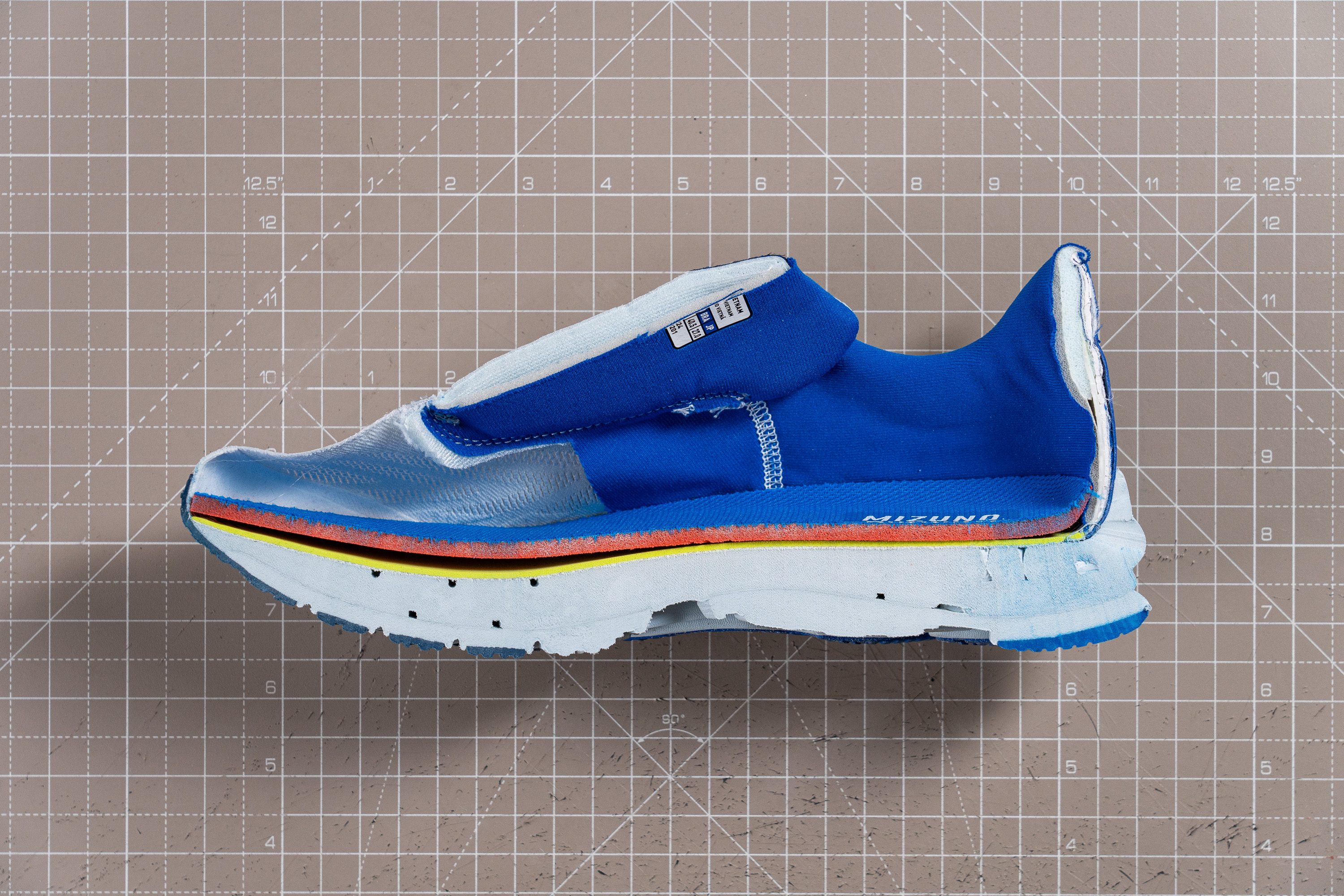
| Wave Sky 8 | 10.0 mm |
| Average | 8.6 mm |
Midsole softness
Let’s dive into the most intriguing part—the midsole of the Wave Sky 8. Its bubble-like design not only looks pillow-soft but truly feels it, confirmed by our durometer scoring it at an incredibly soft 14.0 HA.
At first glance, it appears the shoe sports a single foam slab, but a closer inspection in the lab revealed a dual-compound structure. This would be overlooked in almost any other review, which underscores the importance of cutting shoes in half like we do here in the lab.
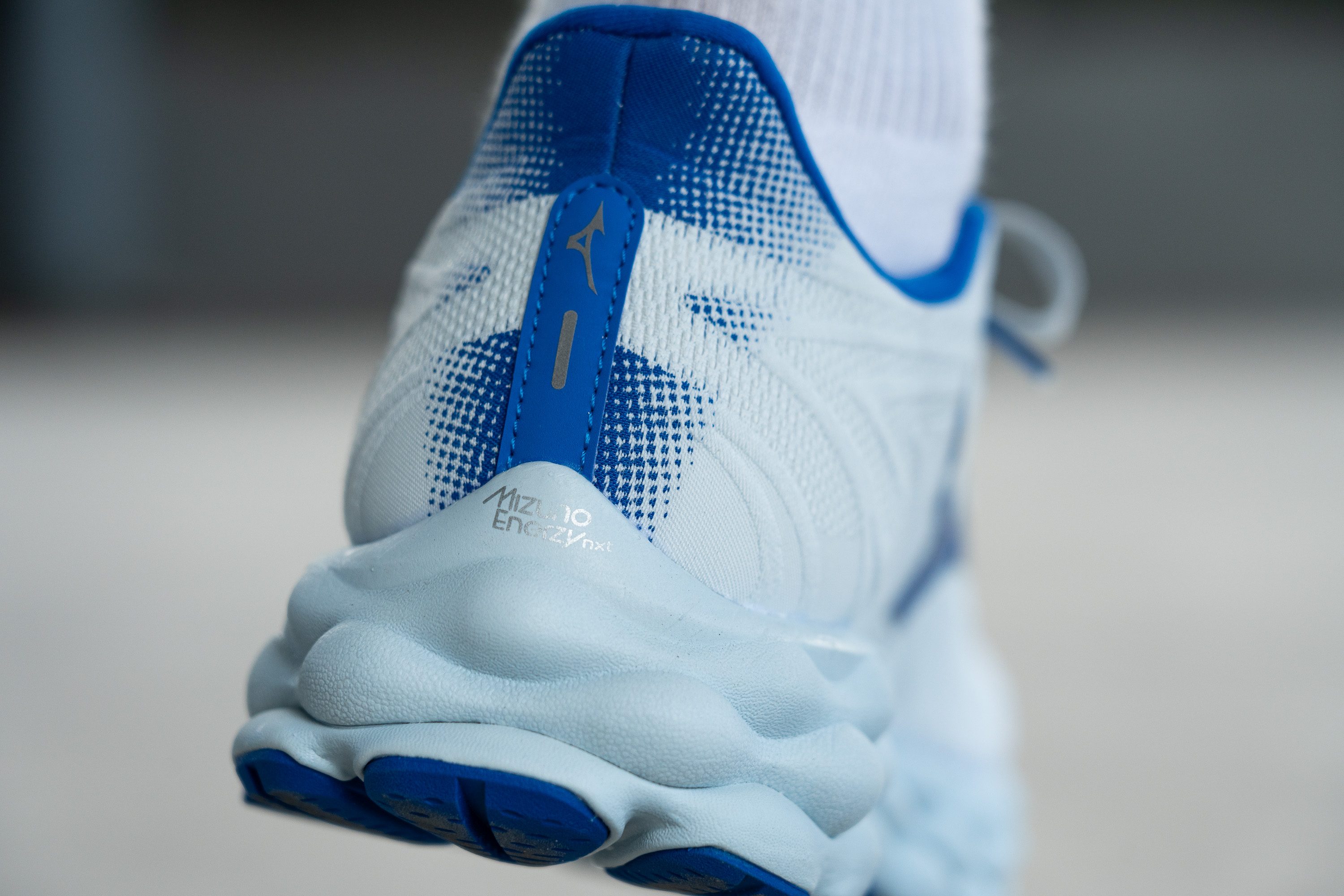
The upper layer, directly cushioning your foot, is Mizuno's latest innovation in the Wave Sky series—named Enerzy NXT. This new, supercritical EVA compound is, without doubt, one of the most responsive and high-performing EVA foams we've encountered to date!
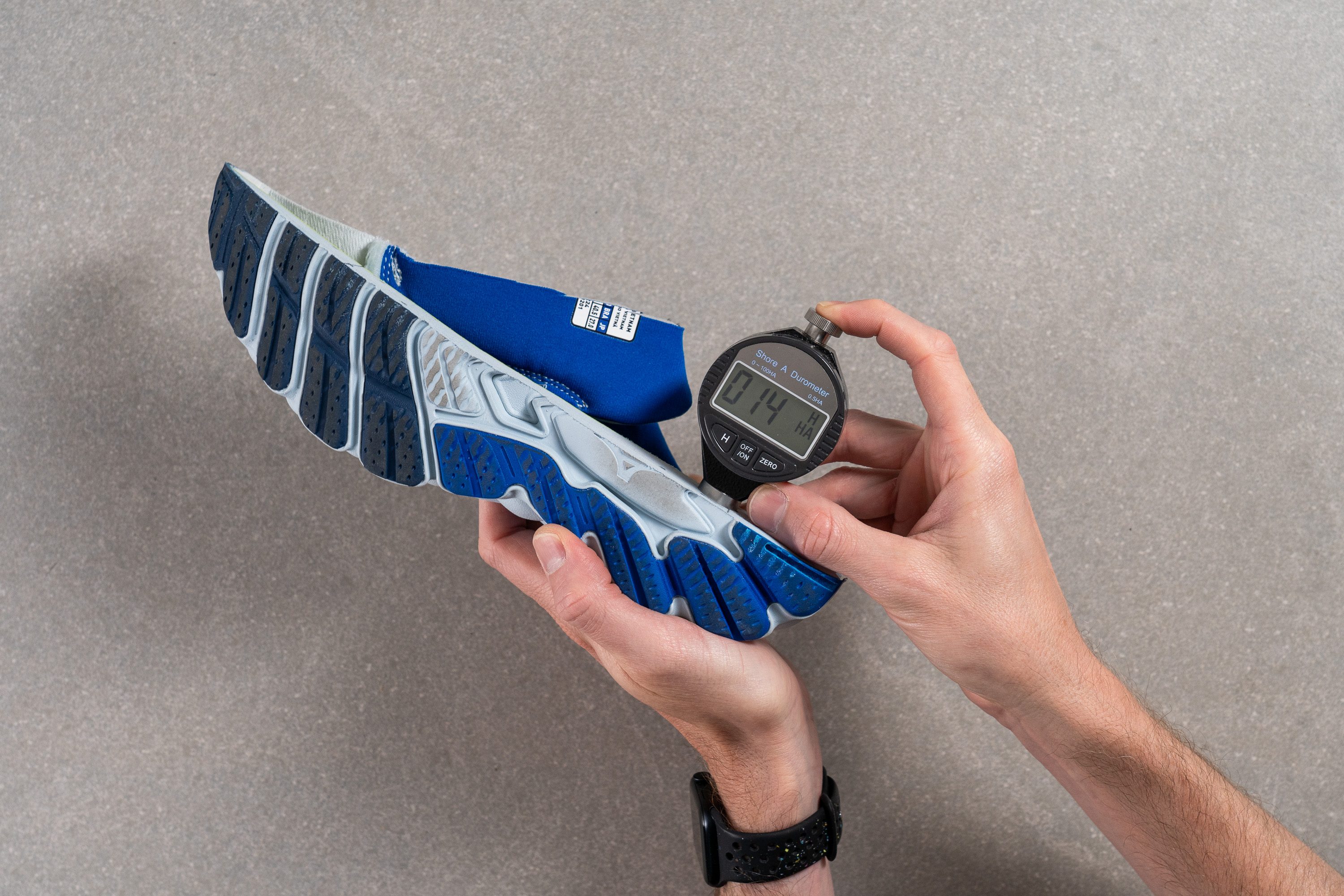
| Wave Sky 8 | 14.0 HA |
| Average | 20.4 HA |
Secondary foam
While the upper layer boasts Enerzy NXT, the base layer incorporates Enerzy—a robust, enduring foam delivering a firmer ride at 26.4 HA. This combination provides stability to Enerzy NXT and protects it from wear, significantly extending its life.
Do we appreciate this configuration? Generally, yes. However, we also think on the possibilities if the shoe were made entirely of Enerzy NXT. It could have offered incredible fun, though admittedly, it may not have been stable as a table.
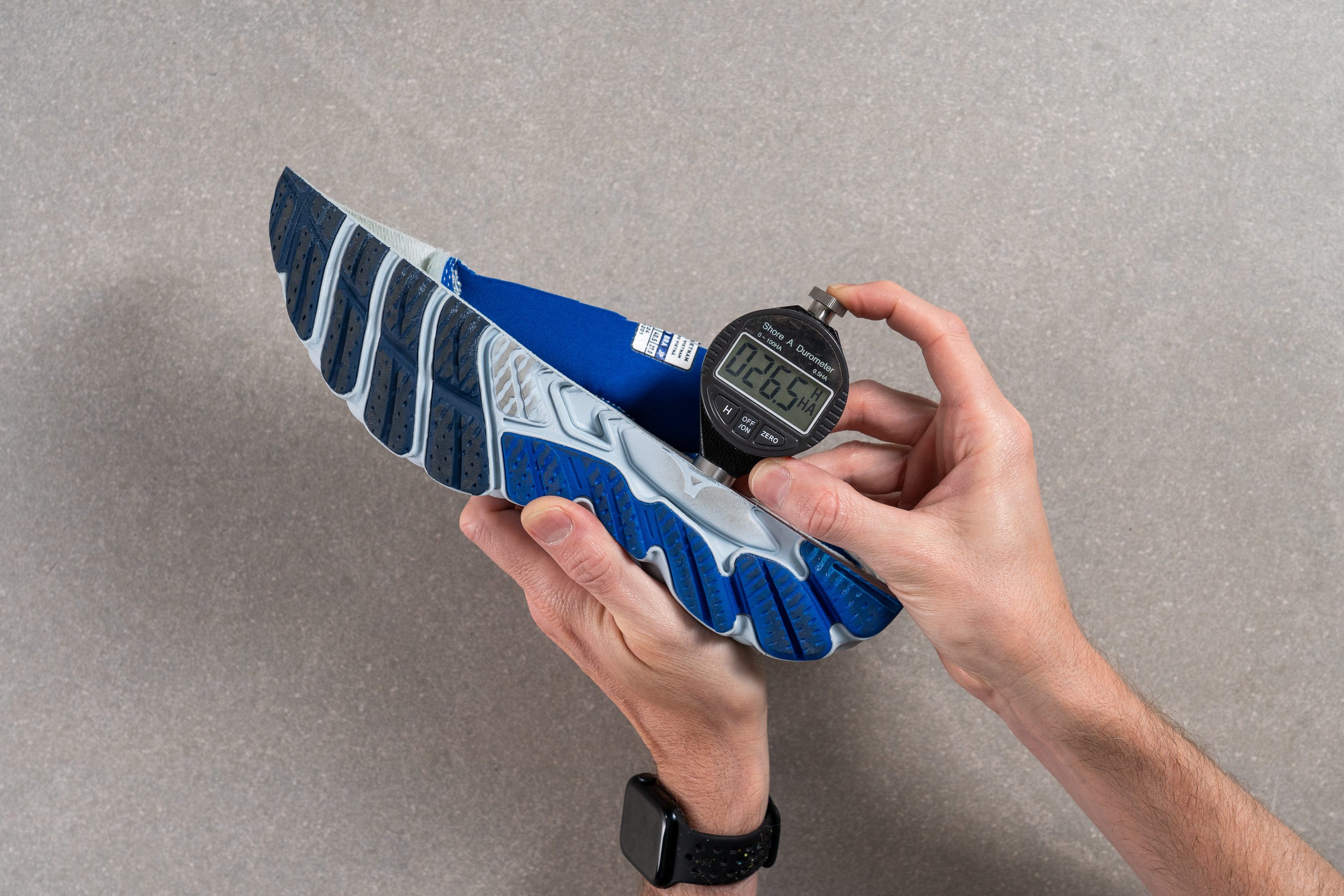
| Wave Sky 8 | 26.4 HA |
| Average | 22.7 HA |
Rocker
The Wave Sky 8 remains a non-rockered shoe, which is possible because it maintains a strong flexibility. This means it doesn’t need a high-curved forefoot to help with forward movement—your feet naturally take over, doing the work!
In our view, this design choice is perfect for a daily trainer, allowing your feet to engage without relying on too much mechanical support.
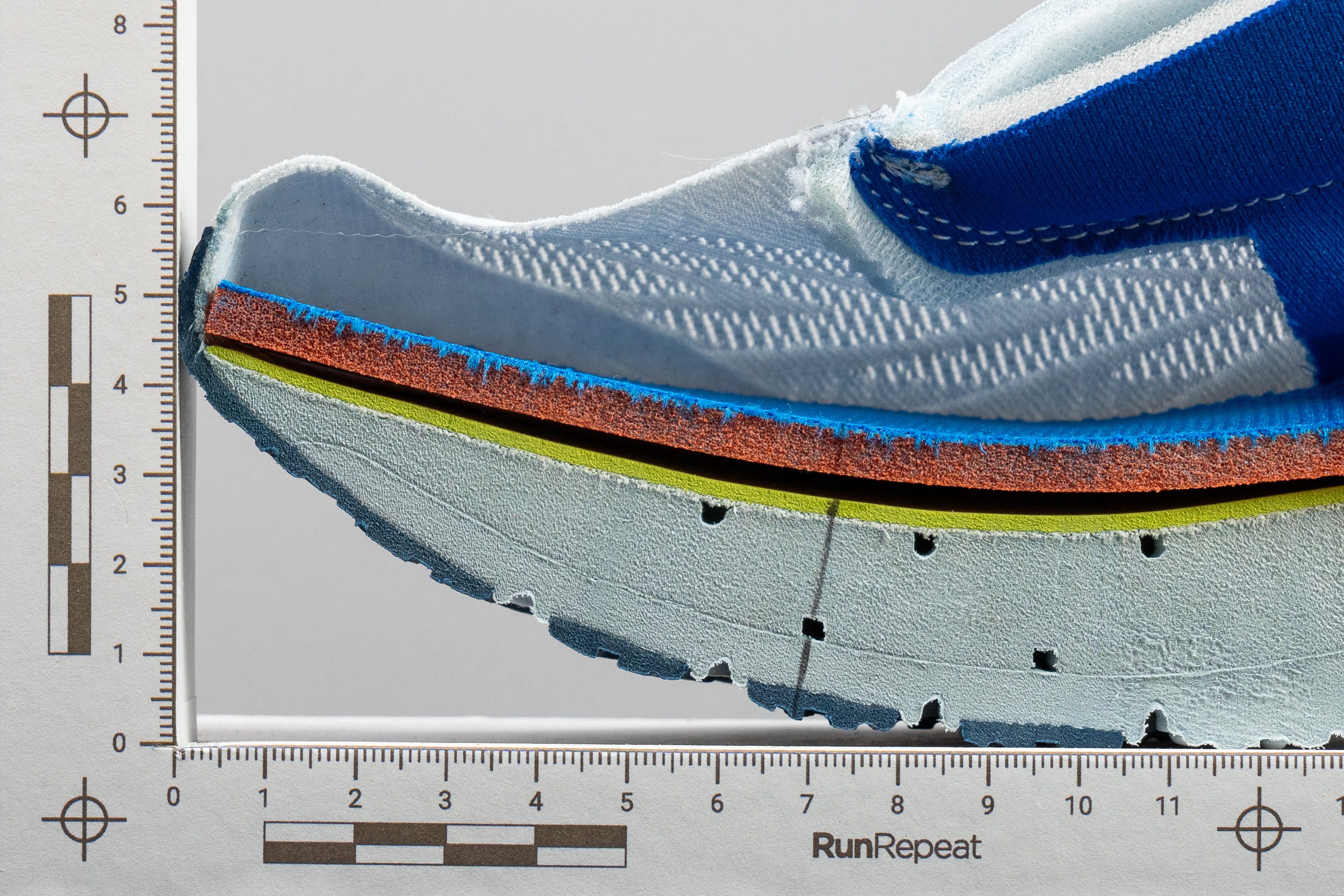
Size and fit
Size
Mizuno Wave Sky 8 fits true to size (47 votes).
Internal length
| Wave Sky 8 | 274.5 mm |
| Average | 269.4 mm |
Width / Fit
UpdatedThe Wave Sky 8 is meant for a wide range of runners and its versatility is reflected in a fairly accommodating fit. Filling the shoe's interiors with gel, we were able to retrieve the shoe's one-to-one replica and measure its dimensions quite precisely.
Checking the shoe's width between the big toe and the pinkie, we got a slightly above-average reading of 97.0 mm implying a relaxed medium-width fit. Mizuno also provides a wide-size version in certain markets like USA or Japan to accommodate those with broader feet.
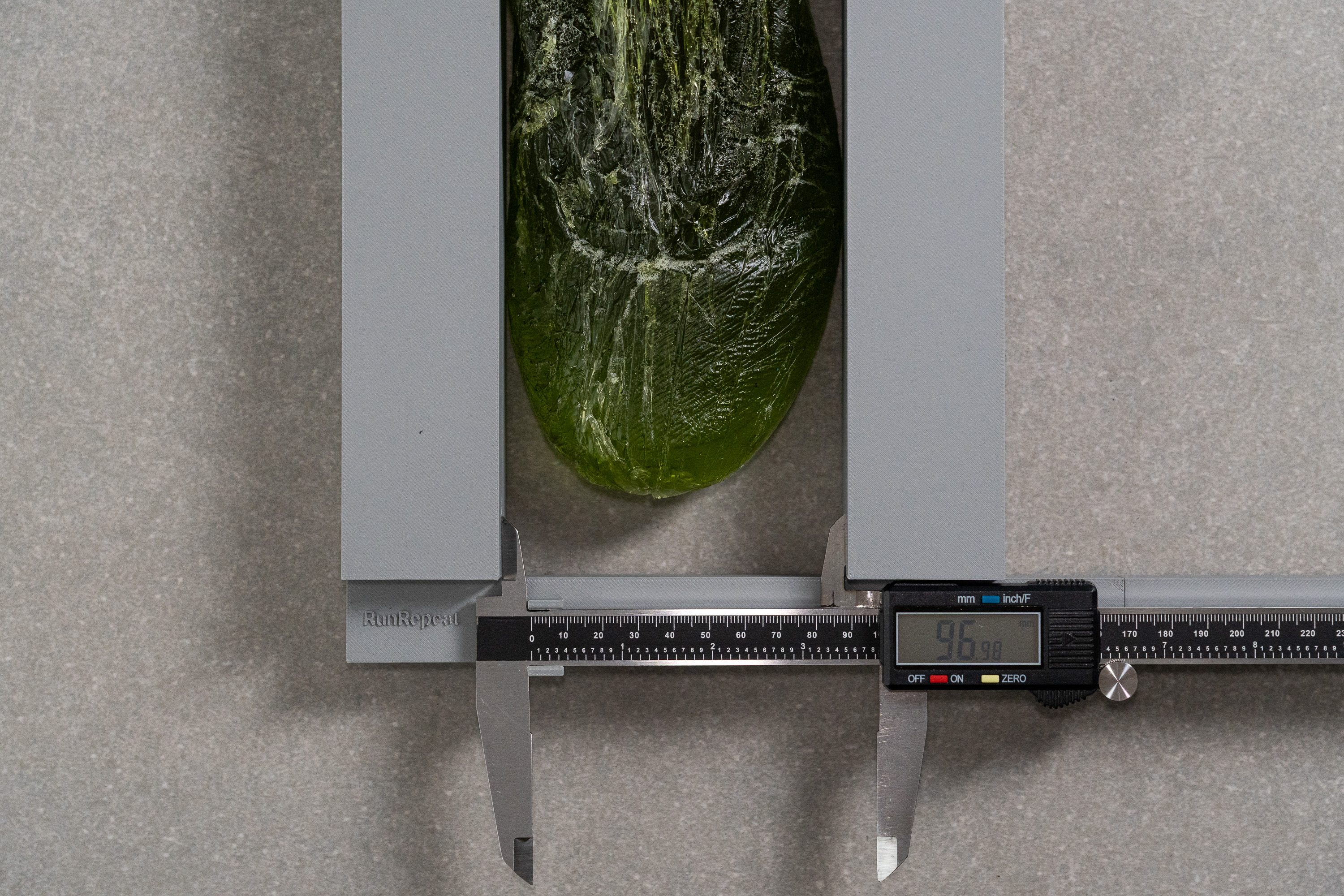
| Wave Sky 8 | 97.0 mm |
| Average | 95.1 mm |
Toebox width
UpdatedWe also checked if the shoe had any significant toebox tapering by measuring its width in the big toe area. Of course it did not with an above-average reading of 75.0 mm and a fairly rounded shape.
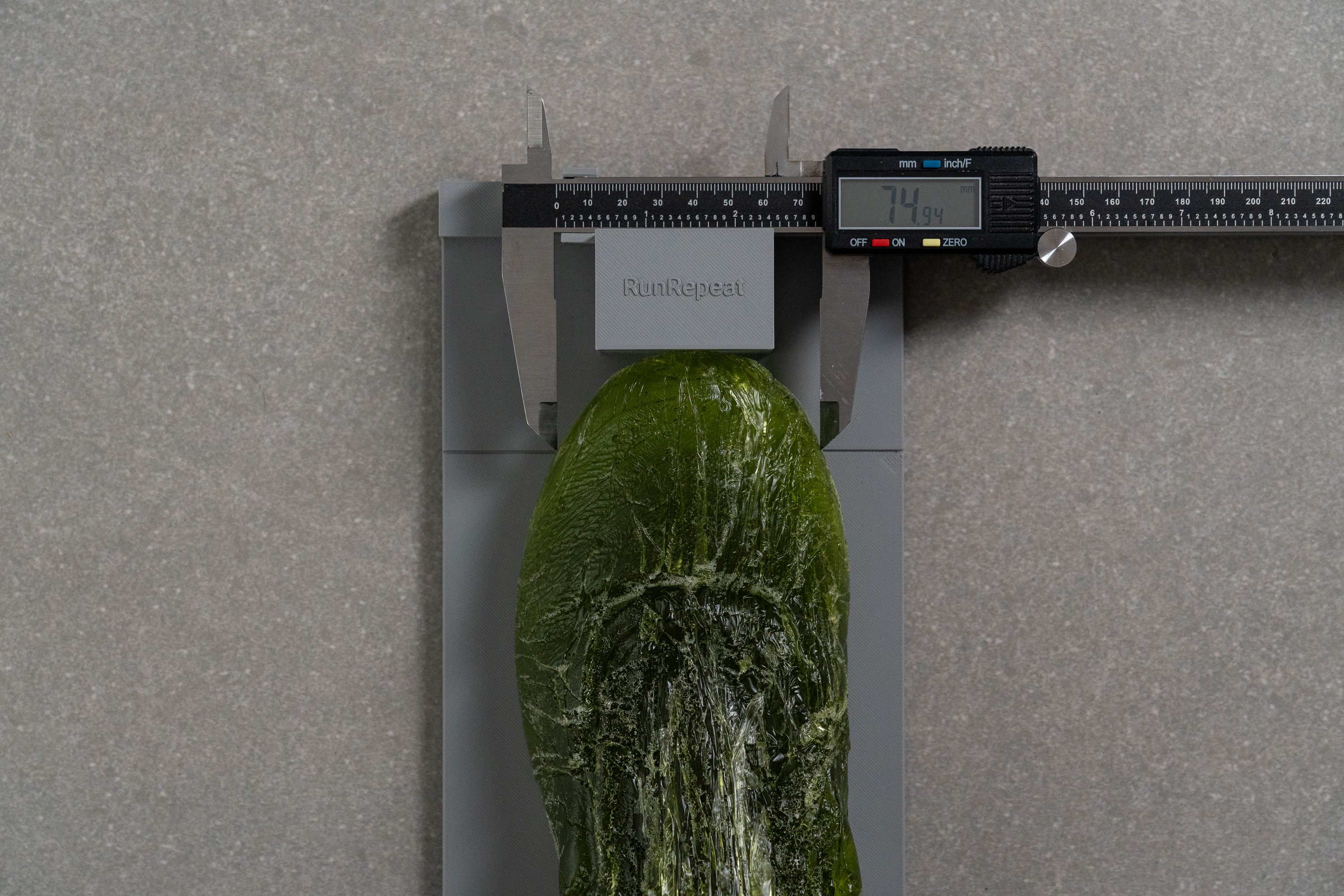
| Wave Sky 8 | 75.0 mm |
| Average | 73.3 mm |
Toebox height
Even though its toebox height is a tad bit shallower than average, the shoe provides sufficient vertical space for some toe splay.
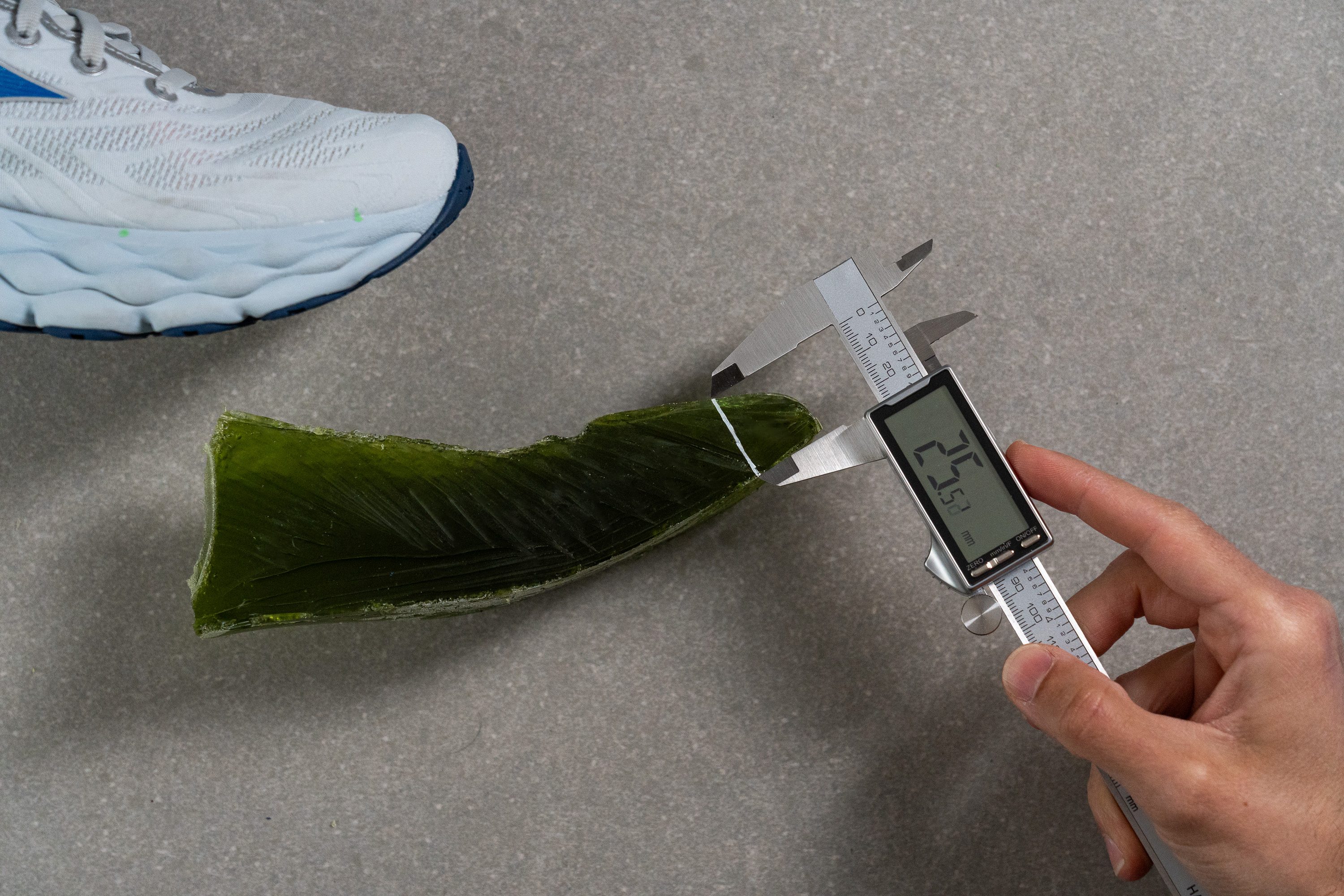
Our caliper recorded a medium-range height of 25.5 mm but the upper material is quite forgiving too.
| Wave Sky 8 | 25.5 mm |
| Average | 27.0 mm |
Traction / Grip
Traction test
We tested the Wave Sky 8 and recorded a 0.34 score for forefoot traction that didn't leave us very satisfied. Dry pavement feels fine underfoot, but once the ground gets slick, this average-grip trainer starts to show its limits.
| Wave Sky 8 | 0.34 |
| Average | 0.49 |
Outsole design
The midsole benefits greatly from the outsole's extensive coverage, making it one of the most well-protected we've encountered recently in the lab. Additionally, the large grooves in the forefoot enhance the shoe's flexibility and comfort, and we found that's especially noticeable while walking or jogging.
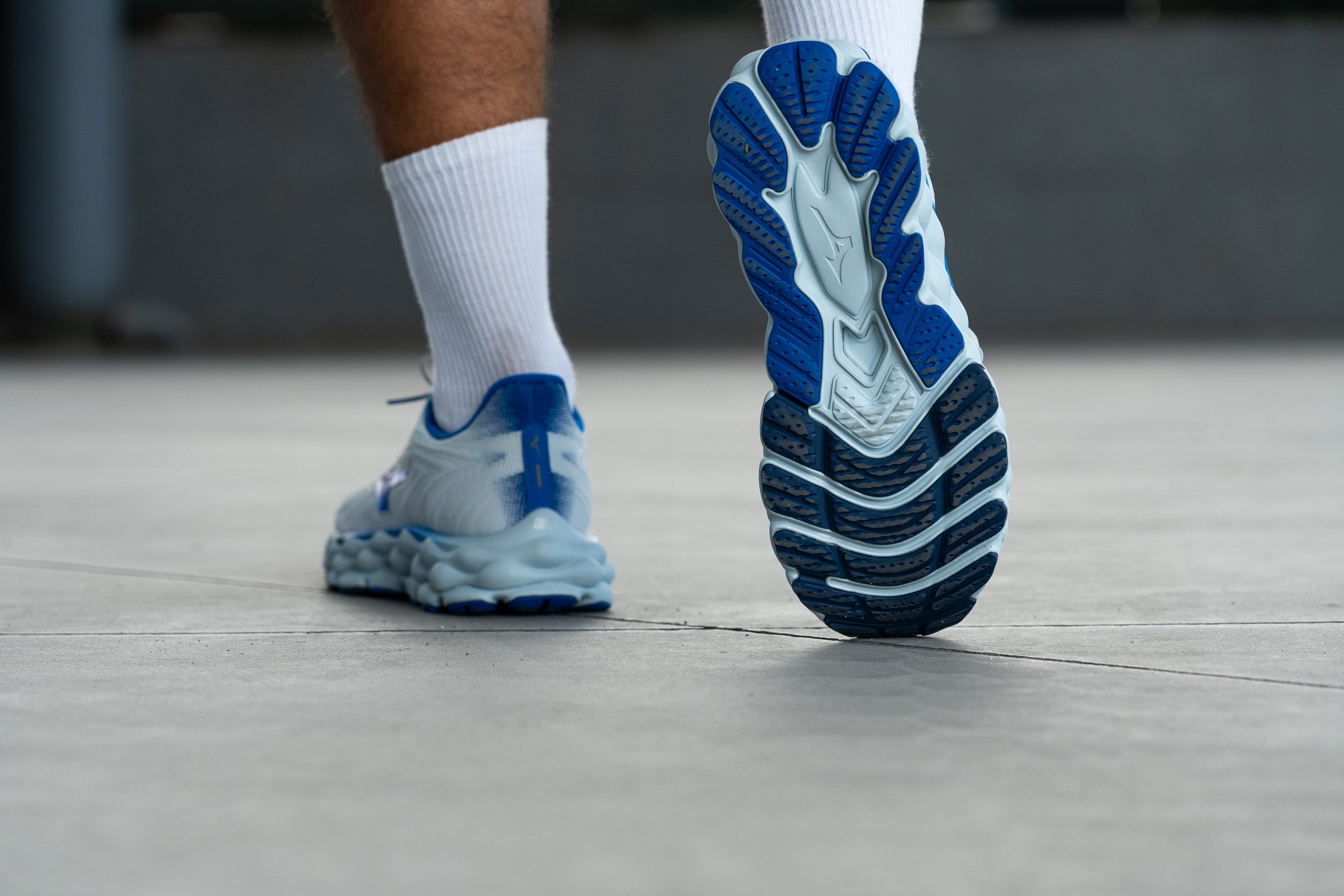
Flexibility / Stiffness
We measured 14.6N in our 30-degree bend test, showing that the Wave Sky 8 offers enough flexibility to handle not only daily runs but also everyday tasks like walking or light gym sessions.
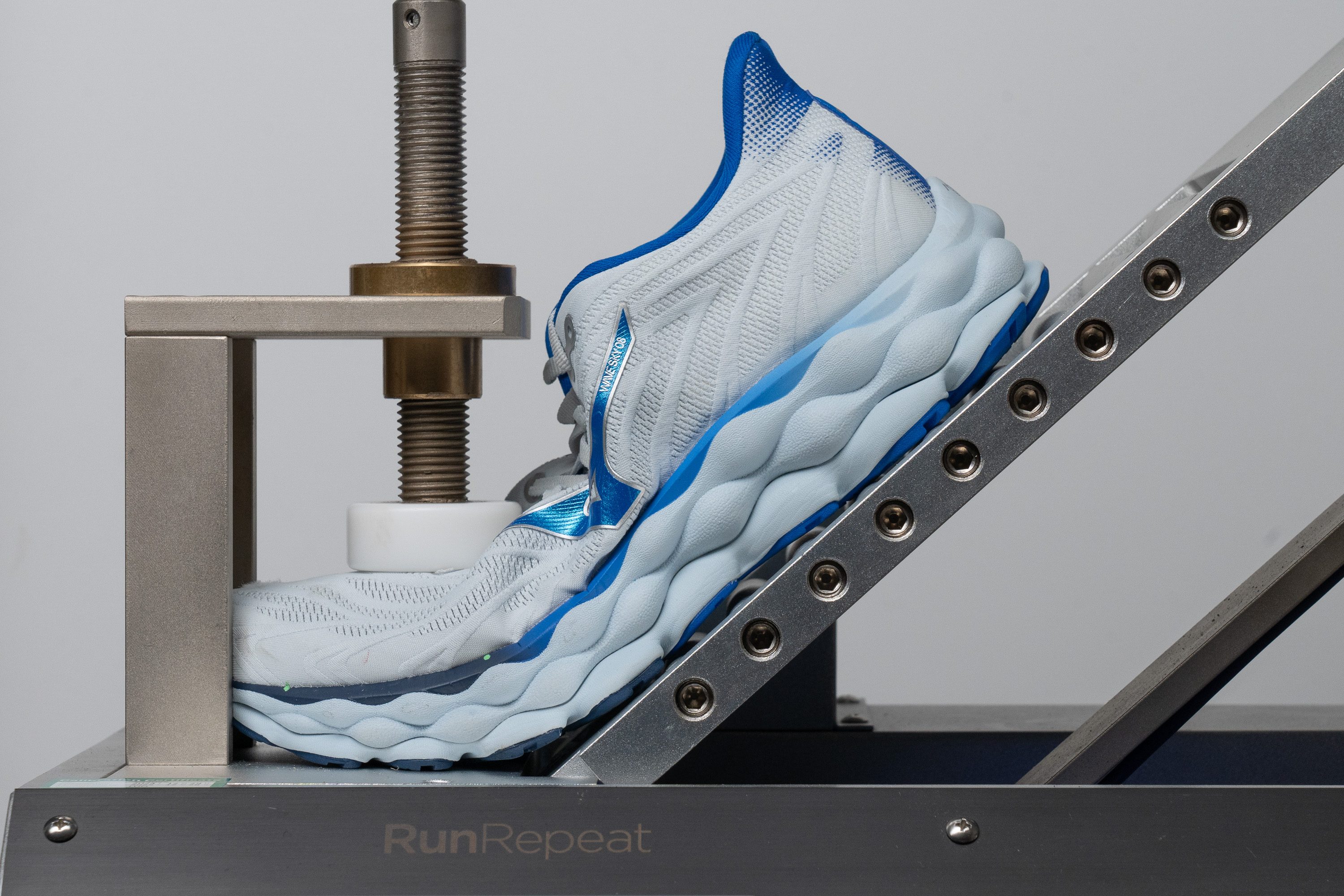
| Wave Sky 8 | 14.6N |
| Average | 15.3N |
Stiffness in cold (%)
After an additional 20 minutes in our freezer, the supercritical EVA foam exhibited impressive resilience, stiffening by only 26%. That's a nice and unexpected result.
| Wave Sky 8 | 26% |
| Average | 33% |
Weight
We previously mentioned how well the Mizuno Wave Sky 8 manages its weight, making it remarkably reasonable for a highly-cushioned daily trainer. At just 9.6 oz or 271g, this shoe defies expectations—it would typically weigh at least 10 oz!
Mizuno truly performed some magic with this shoe’s midsole, crafting an ultra-light foam that significantly reduces weight while maintaining agility. This keeps the shoe impressively nimble despite its skyscraper-high stack and thick outsole.
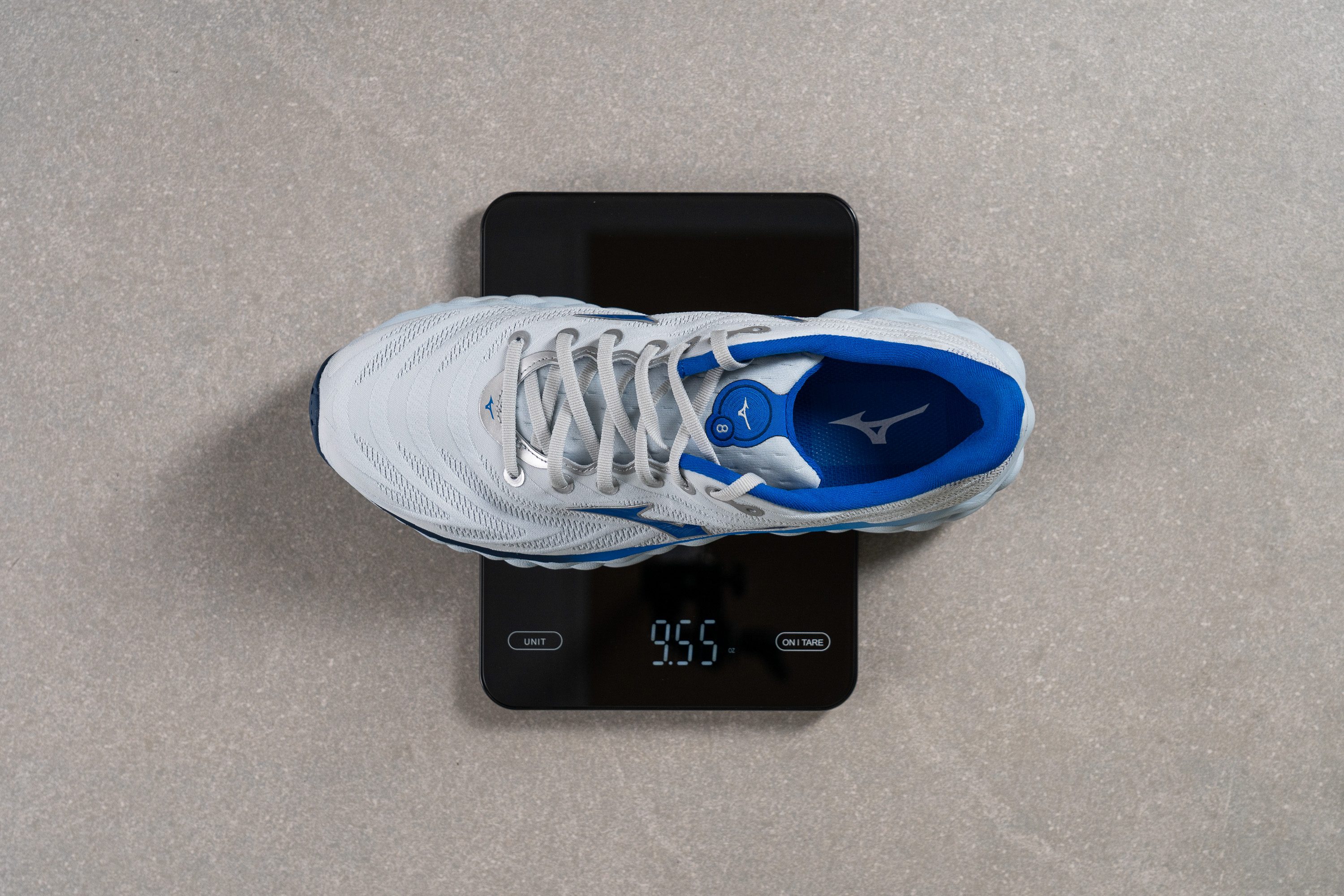
| Wave Sky 8 | 9.6 oz (271g) |
| Average | 9.3 oz (264g) |
Breathability
Upon unboxing the Wave Sky 8, we immediately noticed its lighter build compared to the Wave Sky 7. However, we quickly discovered that this reduction in weight did not stem from the knit upper, as it is on the thicker side and lacks substantial ventilation.
The smoke-pumping test yielded a middling score of 3/5, which we consider suboptimal for a premium road running shoe, although typical for knit uppers. However, the reduced breathability might actually be a boon for runners in cooler climates, turning a potential drawback into a favorable feature.
We observed that Mizuno prioritized stability, crafting a very structured upper around the heel and medial areas while allowing slightly more ventilation in the toebox.
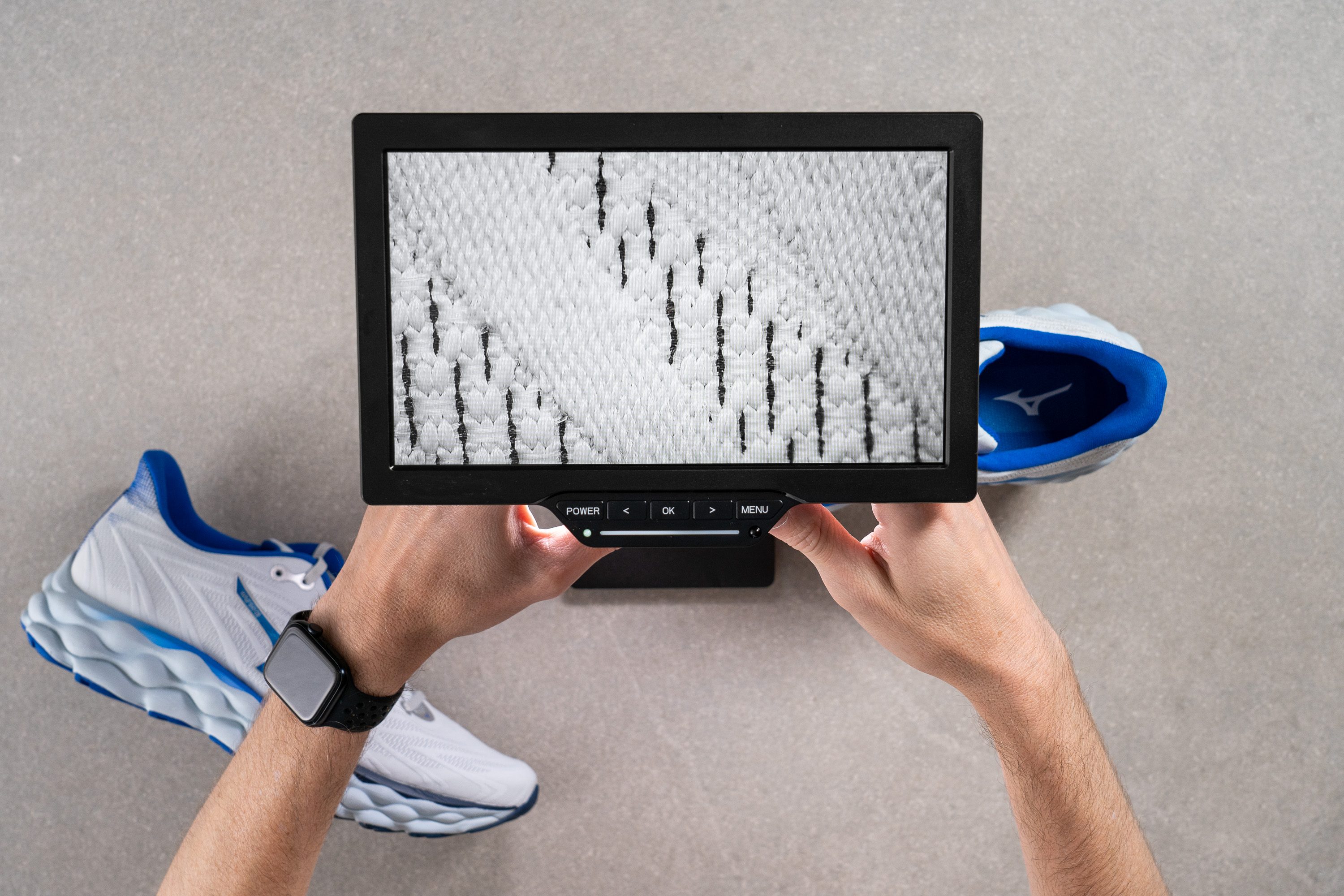
Curious to delve deeper, we examined the shoe under a microscope. There, we clearly saw the tiny gaps that were only hinted at under our light—revealing an impressively high-quality upper.
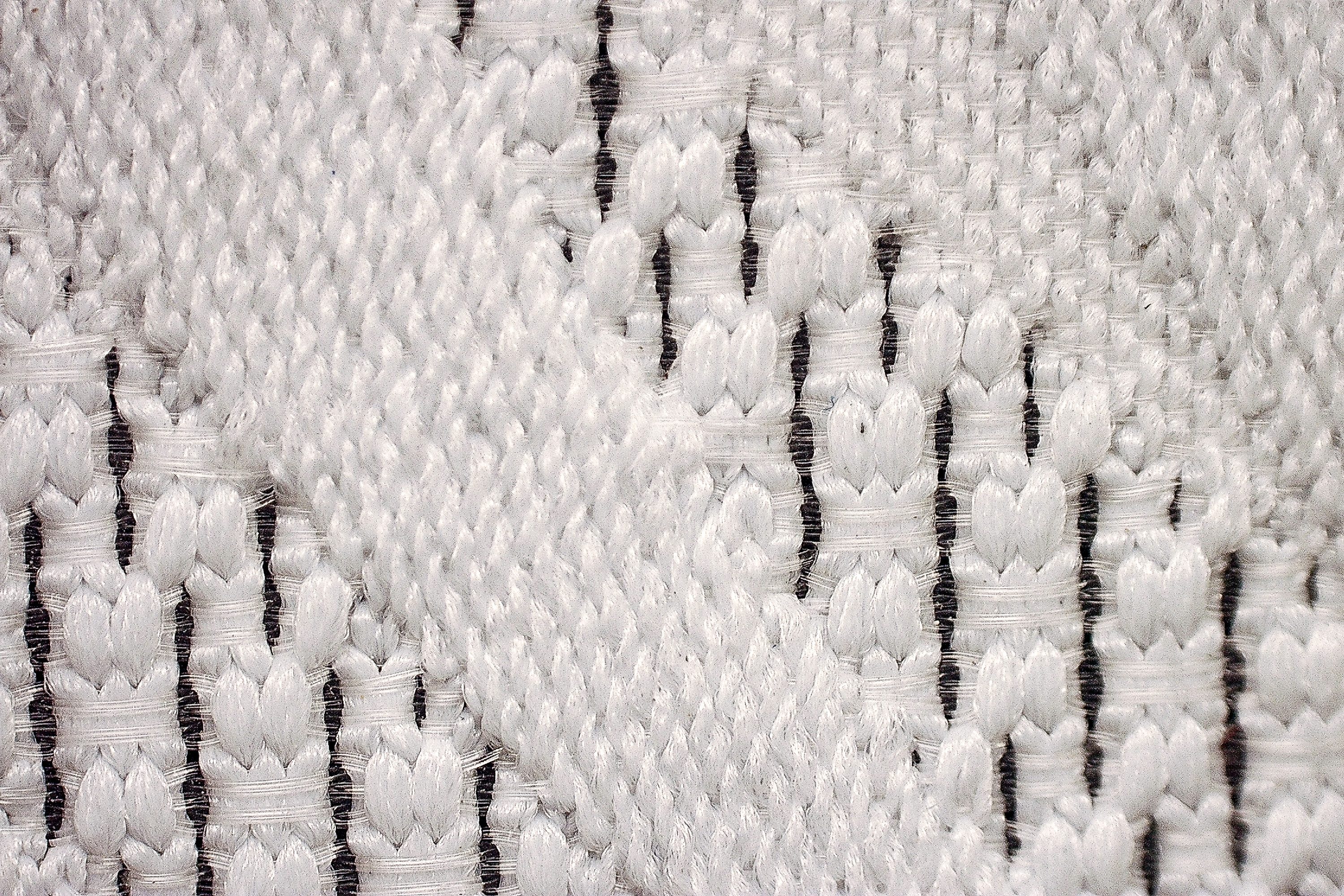
Thankfully, the quality and substantial padding of the Smooth Stretch Woven upper are on par with the price of the shoe, and we were really pleased to discover this. If only it offered more breathability...
| Wave Sky 8 | 3 |
| Average | 3.7 |
Stability
Lateral stability test
The Wave Sky 8 is a 100% neutral running shoe that, from our perspective, doesn't suit those needing even mild stability features. It's now softer than ever without significant enhancements in terms of support.
This isn't necessarily a downside for everyone. Indeed, improved support can sometimes reduce the allure for neutral runners—it often renders the shoe less nimble and somewhat cumbersome. However, if you're concerned about stability, be advised that this shoe might not be the ideal choice for you.
Torsional rigidity
In our evaluations, the Wave Sky 8 earned a mid-range torsional rigidity score of 3/5, affirming its place as a standard daily trainer.
| Wave Sky 8 | 3 |
| Average | 3.5 |
Heel counter stiffness
In our thorough evaluation and hands-on tests, the WS8's heel counter displayed a somewhat rigid design, earning a 3/5 for stiffness. However, this model boasts an abundantly cushioned heel, enveloped in plush padding, which ensures a snug and supportive fit, enhancing the overall running experience especially for heel strikers.
| Wave Sky 8 | 3 |
| Average | 2.9 |
Midsole width - forefoot
Right out of the box, we observed that the forefoot dimensions of the Wave Sky 8 had not widened compared to its predecessor. This observation was confirmed by precise measurements in the lab, which showed a slight decrease to 114.2 mm from 114.7 mm in the previous model.
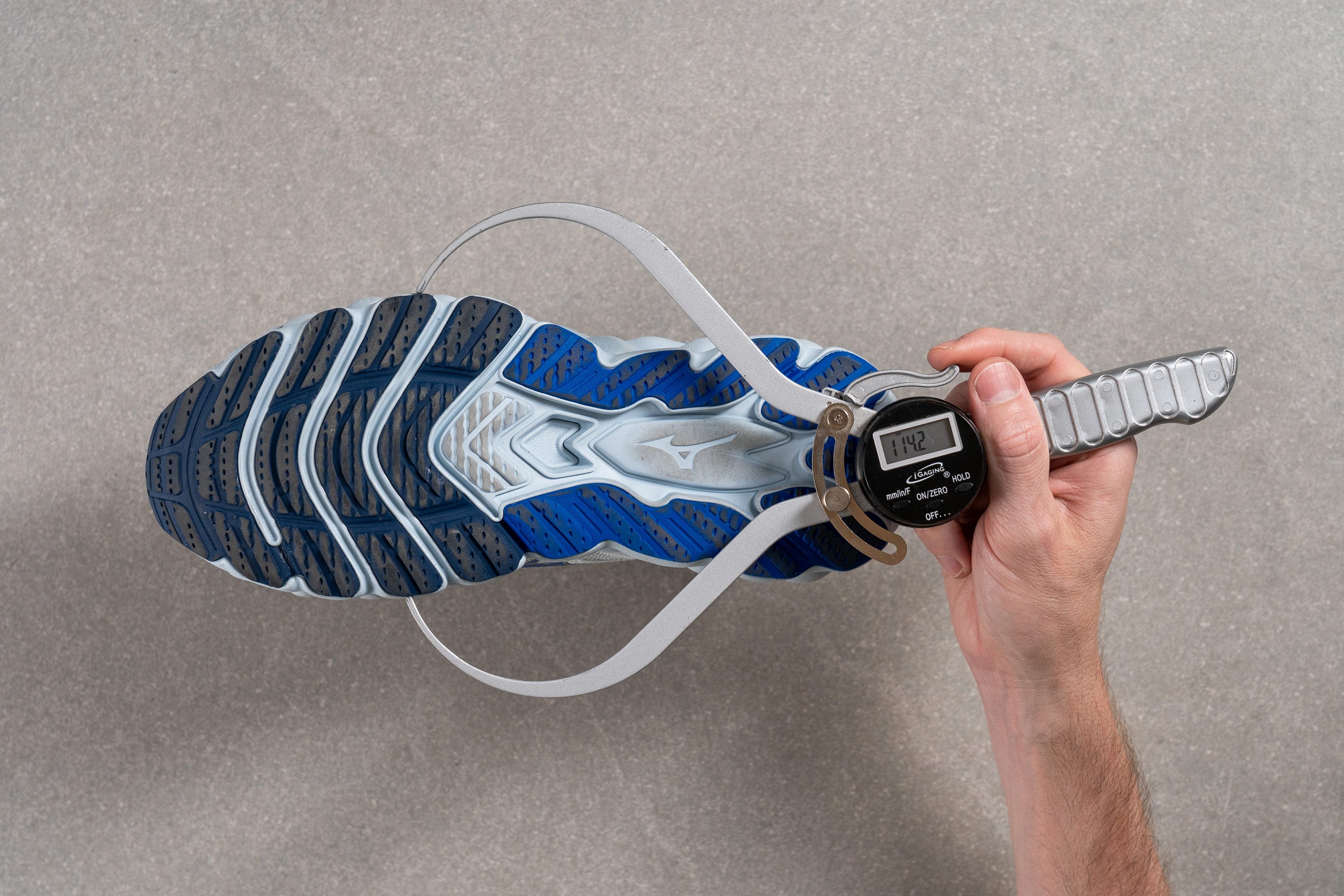
| Wave Sky 8 | 114.2 mm |
| Average | 114.4 mm |
Midsole width - heel
In the heel area, the same approach narrowed the dimensions minimally from 95.3 mm to 93.5 mm, still a typical dimension for daily trainers. However, considering the plush feel of Enerzy NXT, Mizuno might explore slightly expanding this dimension for enhanced support.
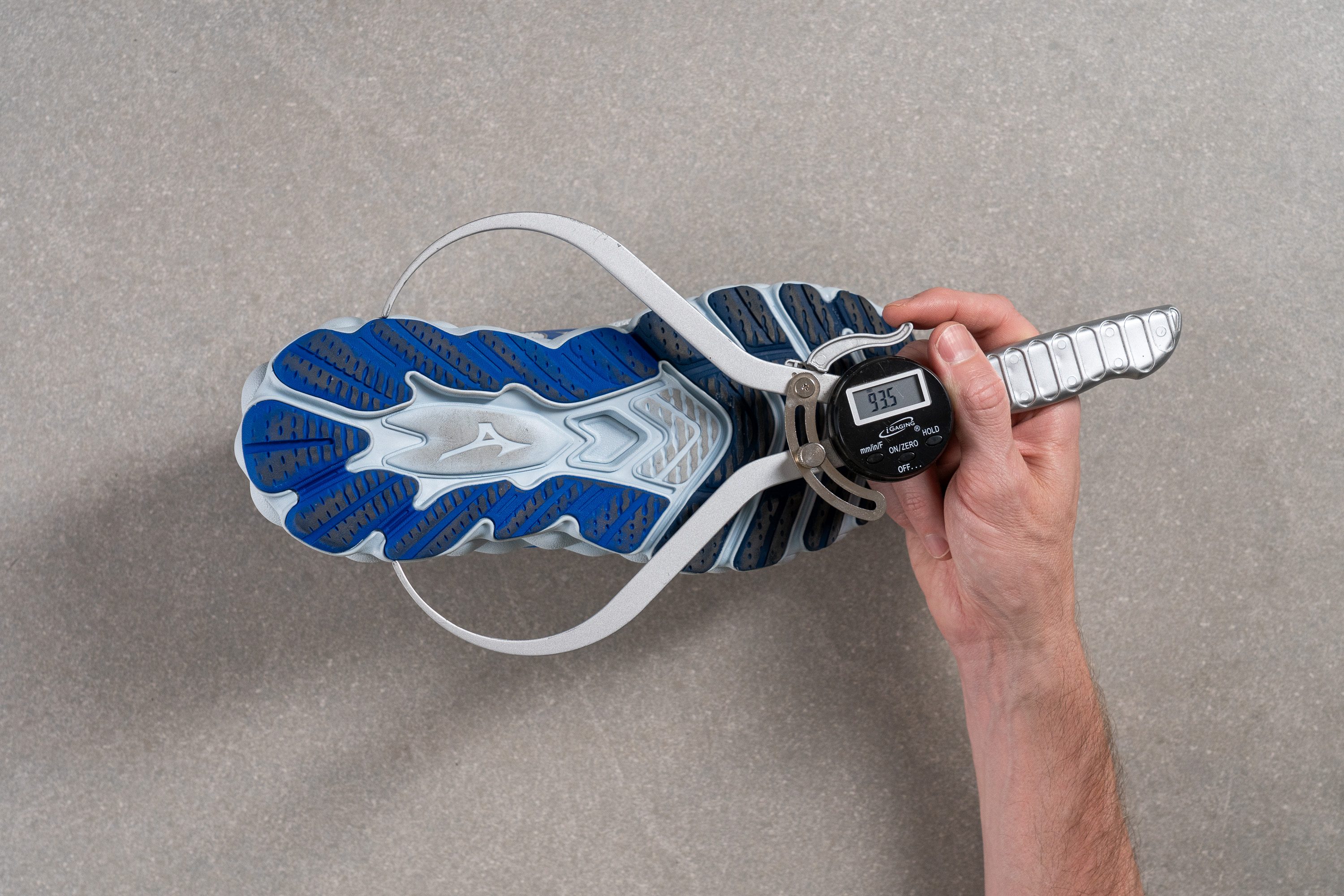
| Wave Sky 8 | 93.5 mm |
| Average | 90.6 mm |
Durability
Toebox durability
We shifted our focus to durability—a priority for many runners.
We were delighted to find that the Wave Sky 8 truly excelled in this area, earning a fantastic 4 out of 5 rating. Even under the harsh treatment of a Dremel, the knit was impressively resistant!
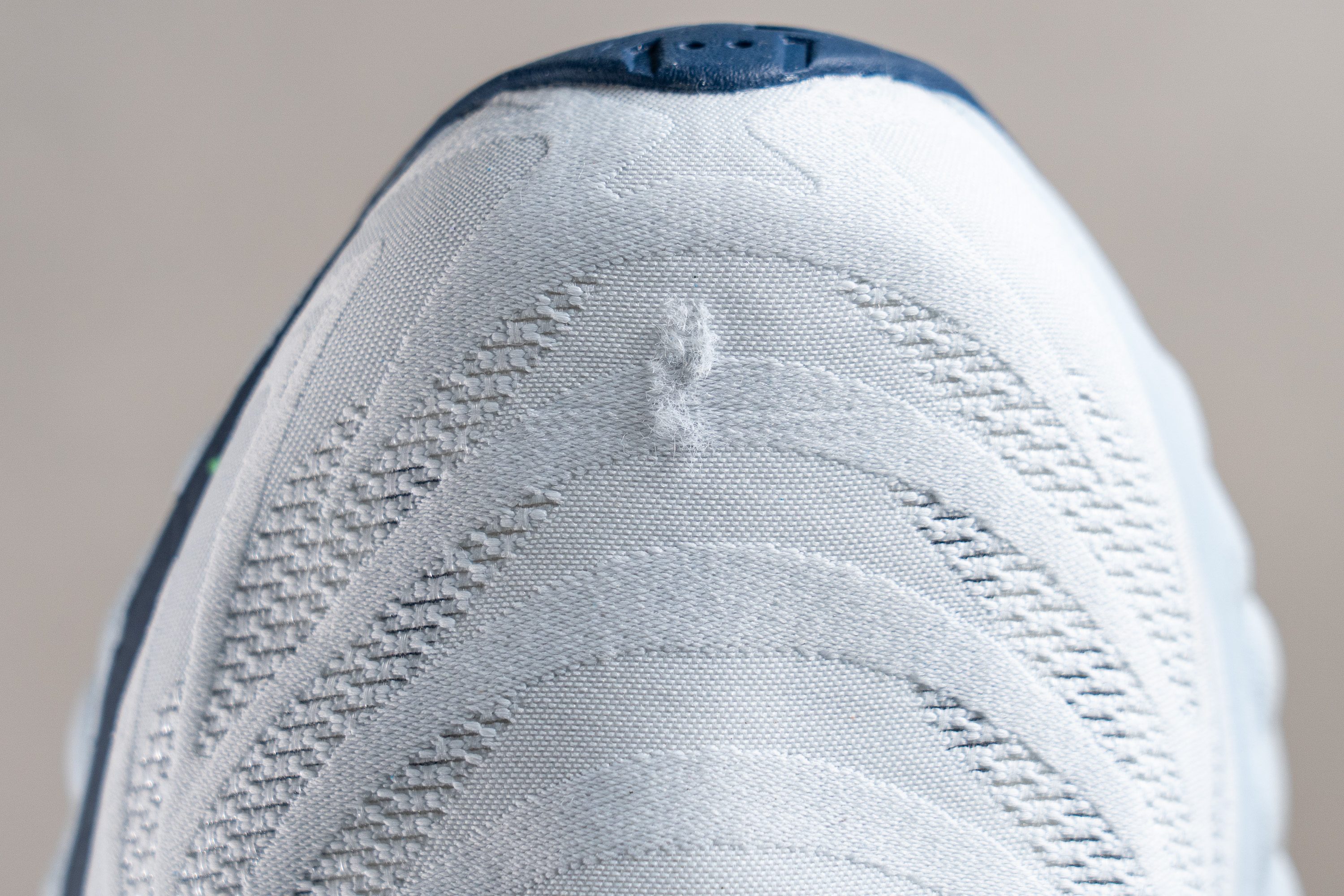
| Wave Sky 8 | 4 |
| Average | 2.6 |
Heel padding durability
What about the heel? Though it doesn't catch the eye like the toebox, this area is crucial as wear can lead to significant discomfort.
Fortunately, Mizuno has impressively addressed our concern, earning another solid 4 out of 5 from our lab team. We're excited to see if this positive trend continues in our ongoing tests.
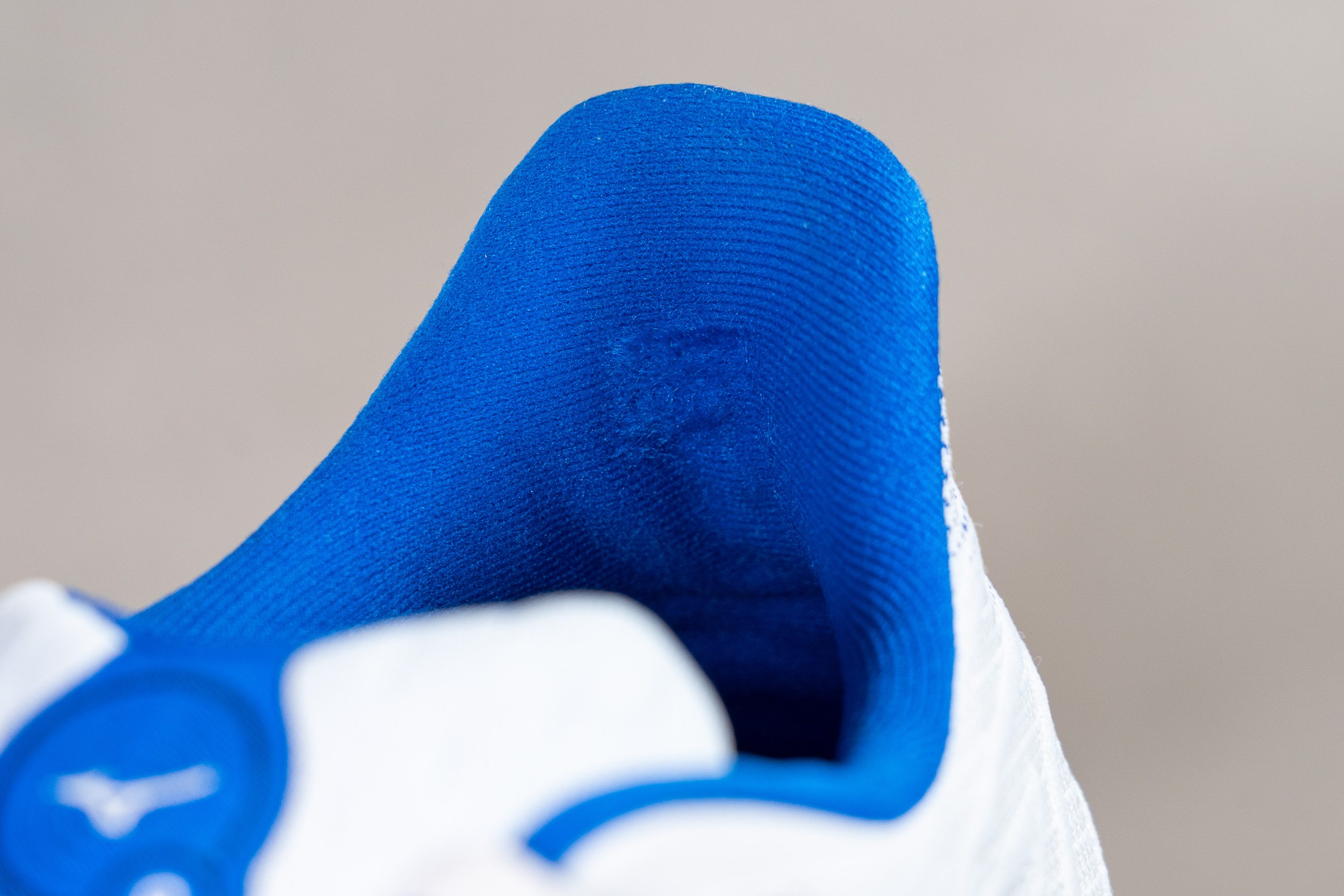
| Wave Sky 8 | 4 |
| Average | 3.4 |
Outsole durability
While the X10 rubber looked grippy to us, our third round with the Dremel revealed a concerning trade-off in durability, much like what one might expect from a car tire.
After our Dremel test, we noted up to 1.8 mm of wear—around twice the average damage we typically record. This level of susceptibility was, frankly, a bit concerning.
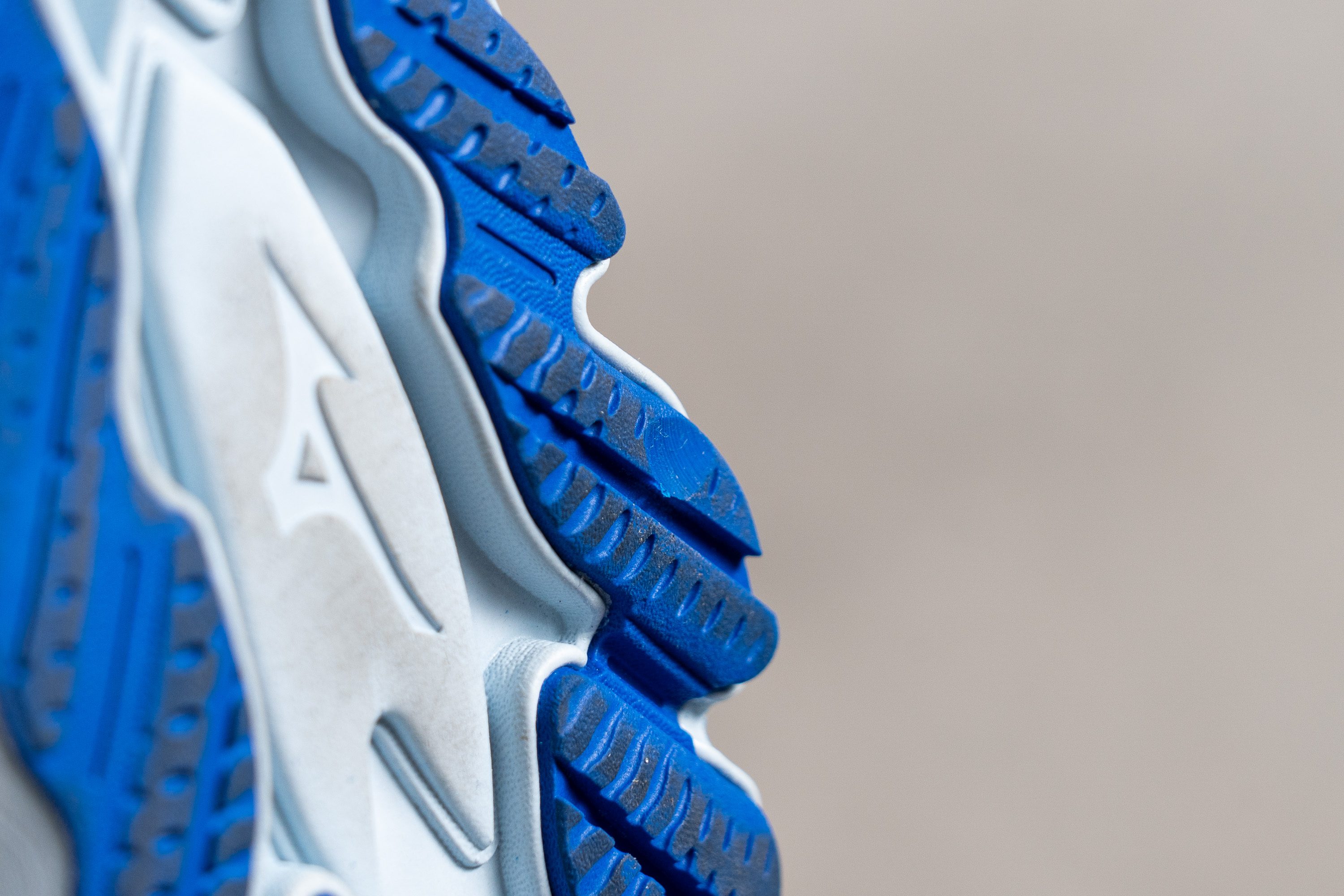
| Wave Sky 8 | 1.8 mm |
| Average | 1.1 mm |
Outsole thickness
Sure thing, Mizuno knew the importance of using a thick rubber in this shoe due to the outsole's wear. In our testing, we noticed their solution involved incorporating a massive 5.0 mm layer of rubber, significantly more than what we usually see here in the lab.
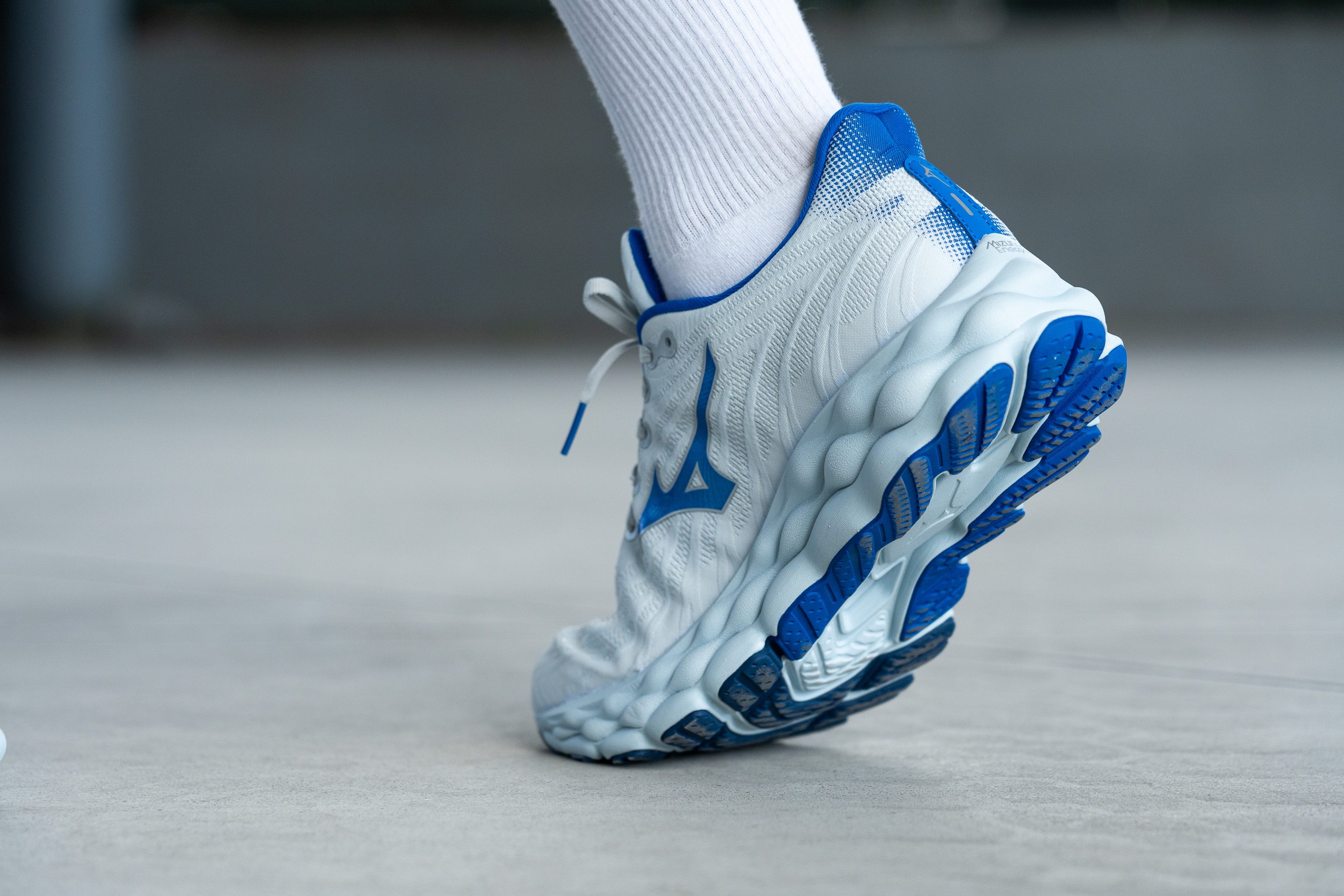
Although not the best case scenario, this approach suits the Mizuno Wave Sky 8 well and solves a potential problem with the lifespan of this outsole.
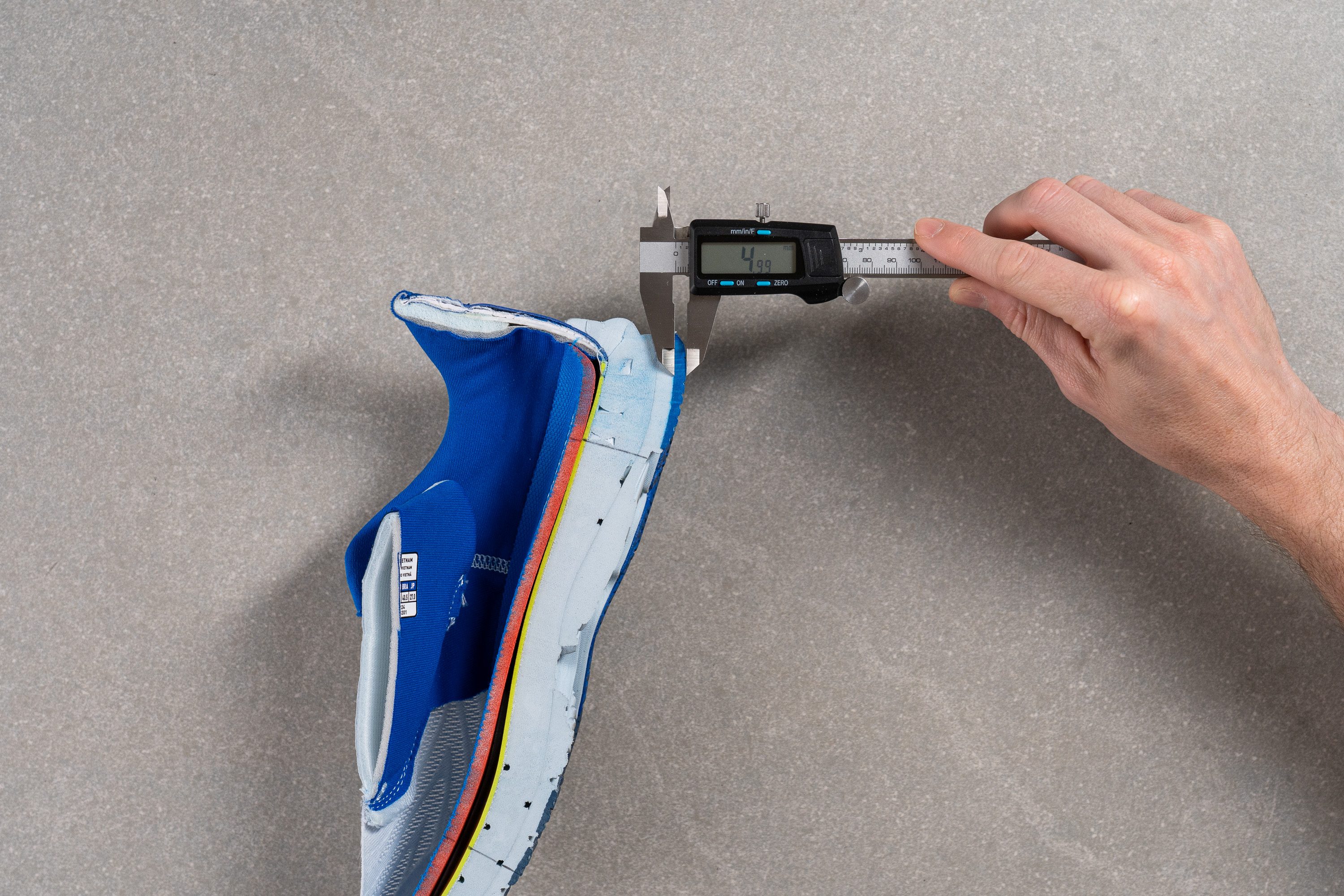
| Wave Sky 8 | 5.0 mm |
| Average | 3.2 mm |
Misc
Insole thickness
The insole, measuring 5.4 mm, is notably thicker than average, significantly boosting the plush sensation underfoot!
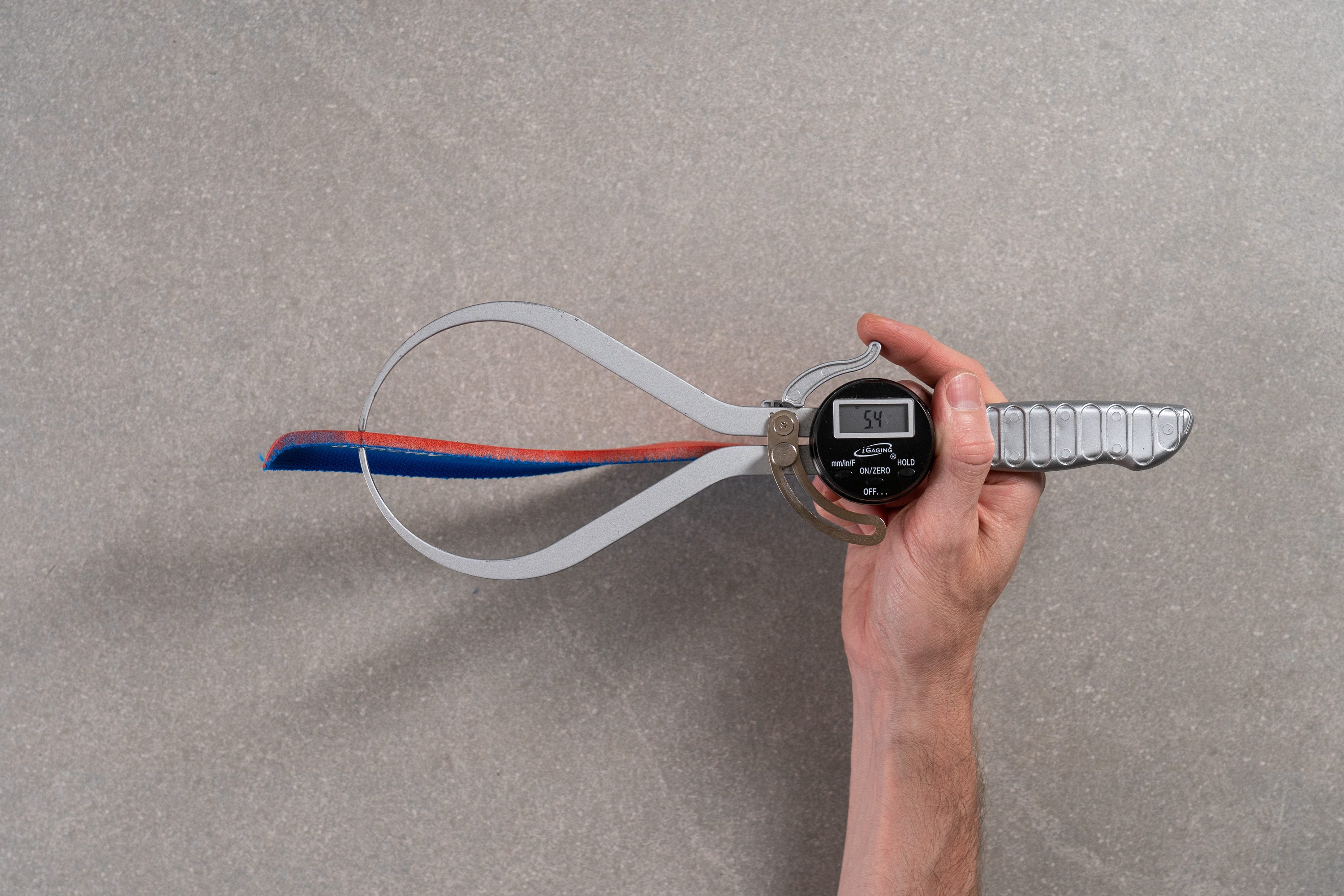
| Wave Sky 8 | 5.4 mm |
| Average | 4.5 mm |
Removable insole
The stock sockliner of the Sky 8 lacks any interesting features, making it a good candidate for an upgrade if you want to. To enhance comfort or support, consider substituting it with custom orthotics or high-quality insoles from other shoes!
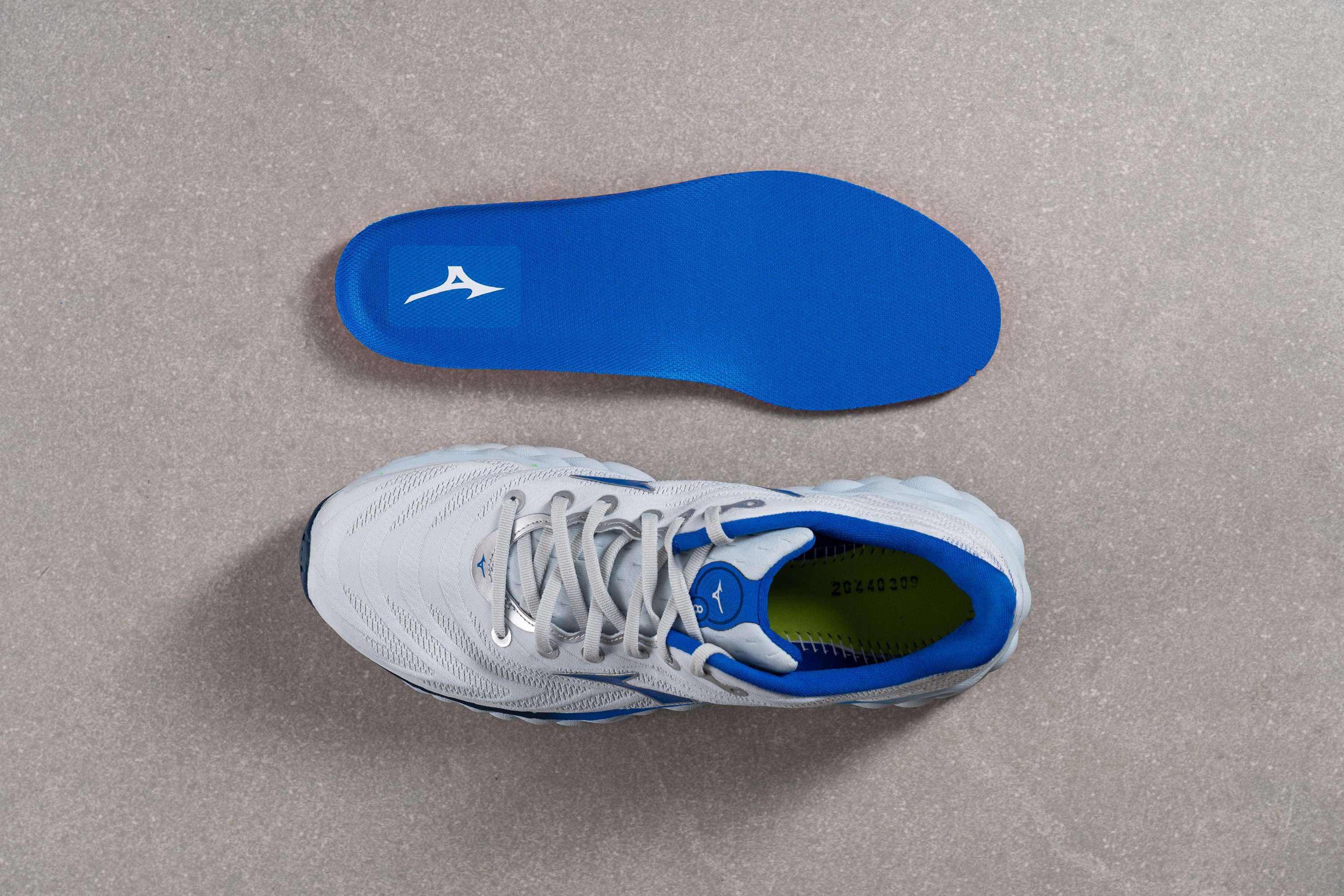
| Wave Sky 8 | Yes |
Midsole softness in cold (%)
Crafted from EVA, we had modest expectations for Enerzy NXT's performance in cold temperatures. Our assumptions held true as it became 32.1% firmer, a performance that is decidedly average at best.
If you're curious about how foams respond to varying temperatures, be sure to read our detailed article on the subject.
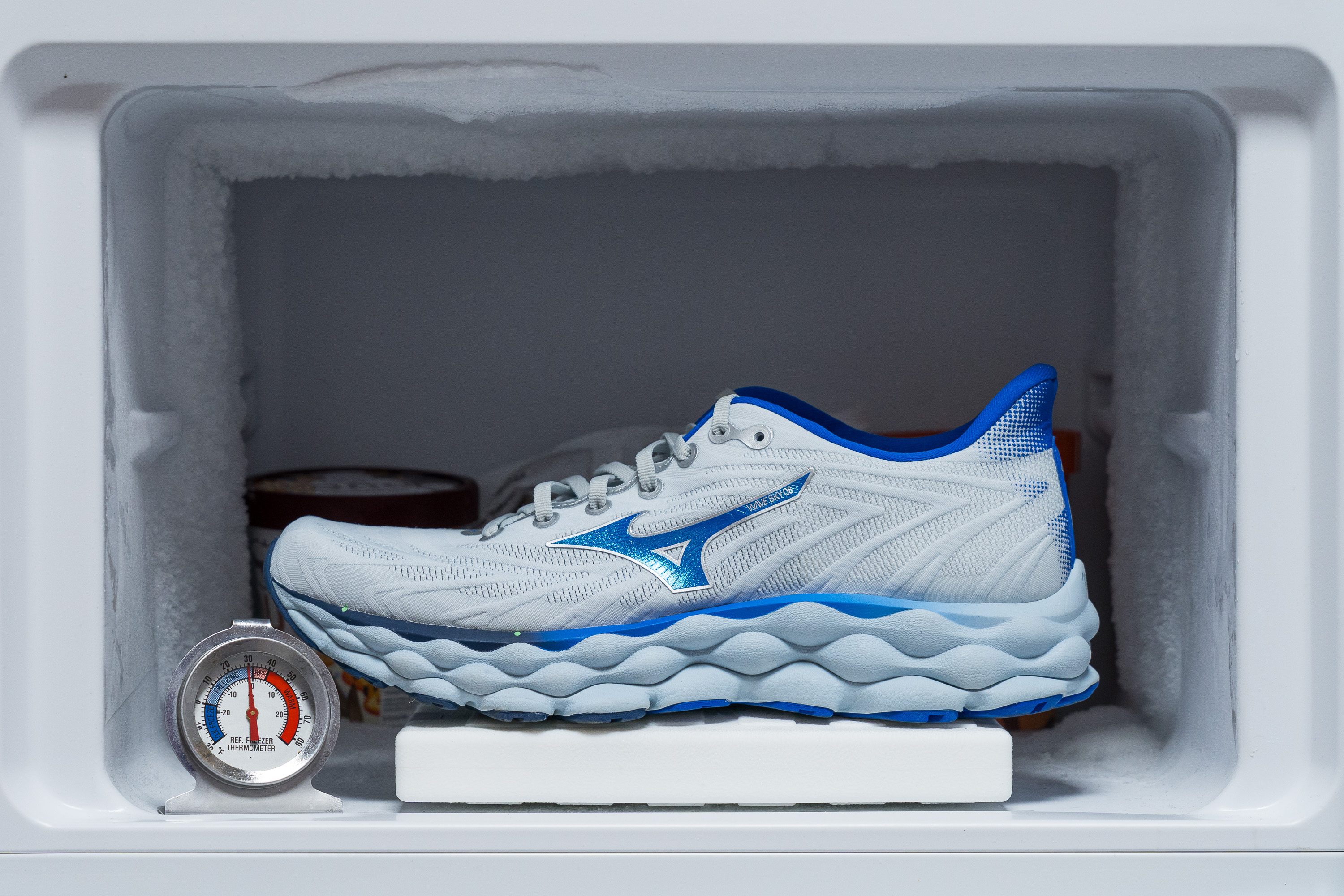
| Wave Sky 8 | 32% |
| Average | 24% |
Reflective elements
We just noted that the Wave Sky 8 is priced notably higher than many everyday trainers—therefore, we anticipated encountering features uncommon in standard road running shoes. Indeed, we were happy to discover some reflective elements!
| Wave Sky 8 | Yes |
Tongue padding
We discovered an impressive 9.9 mm of foam in the shoe's tongue, designed as a thick central layer sandwiched by two slimmer ones. This triple-layered padding not only ensures remarkable comfort but also contributes to a secure, solid lockdown—ideal features for a daily trainer.
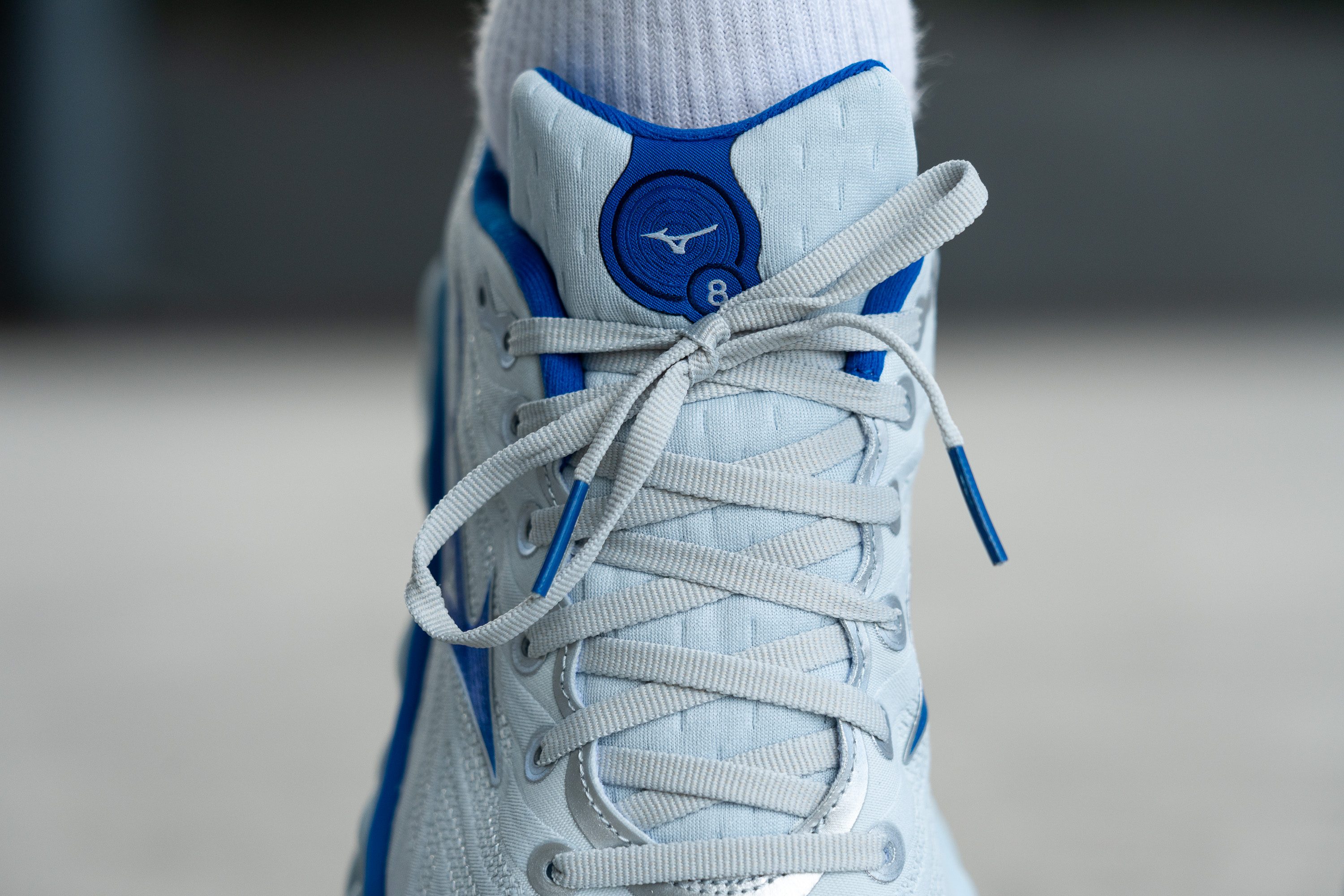
We were also happy with the classic punched-eyelet lacing system, a clear demonstration of Japanese simplicity. This tried-and-true design stands out for its reliability. Why fix what isn't broken?
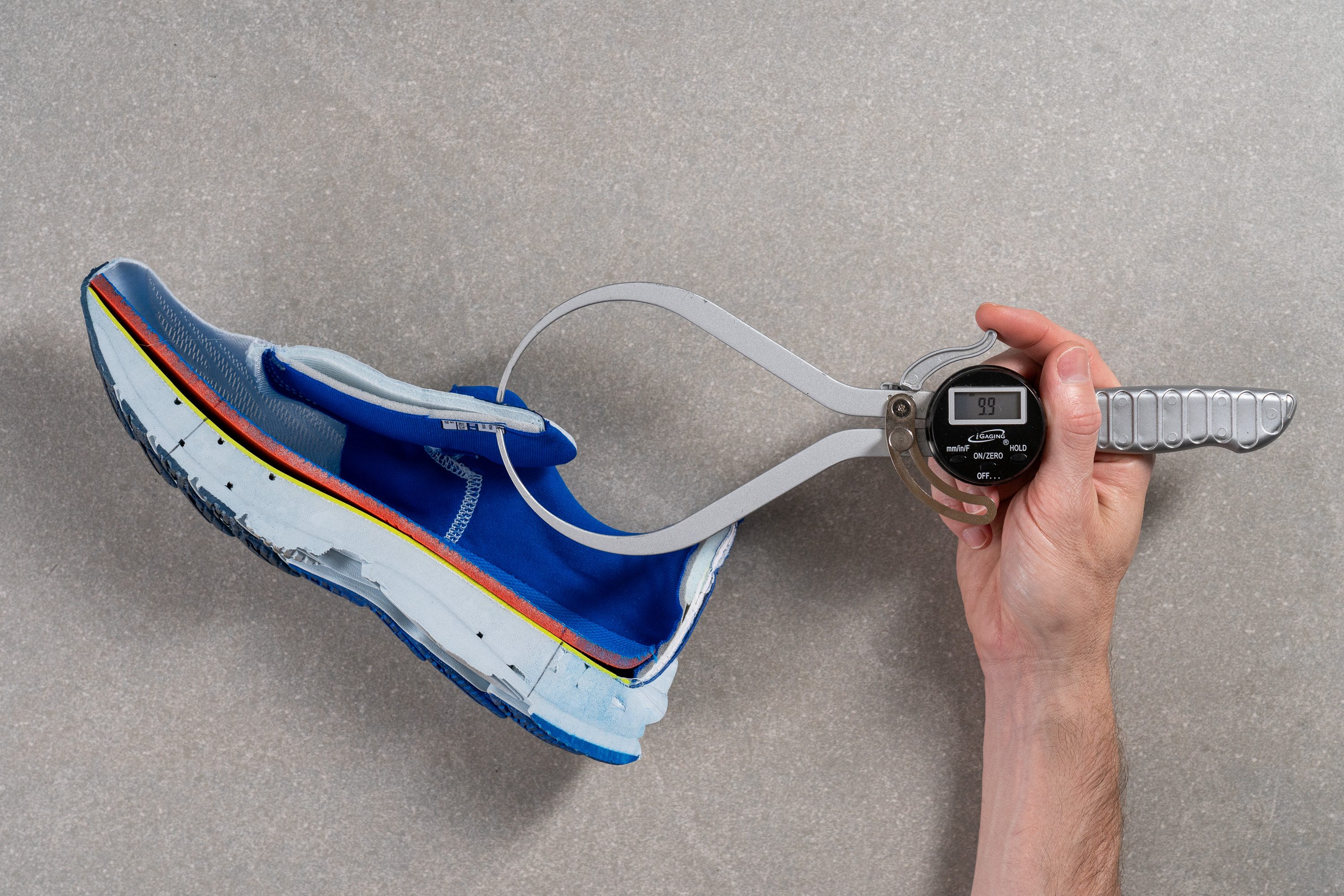
| Wave Sky 8 | 9.9 mm |
| Average | 5.7 mm |
Tongue: gusset type
As one would expect in any high-end daily trainer, we discovered that the tongue is cleverly attached to the sides. Mizuno did it through a partial gusset—our preferred setup, which combines lightweight design with snug comfort.
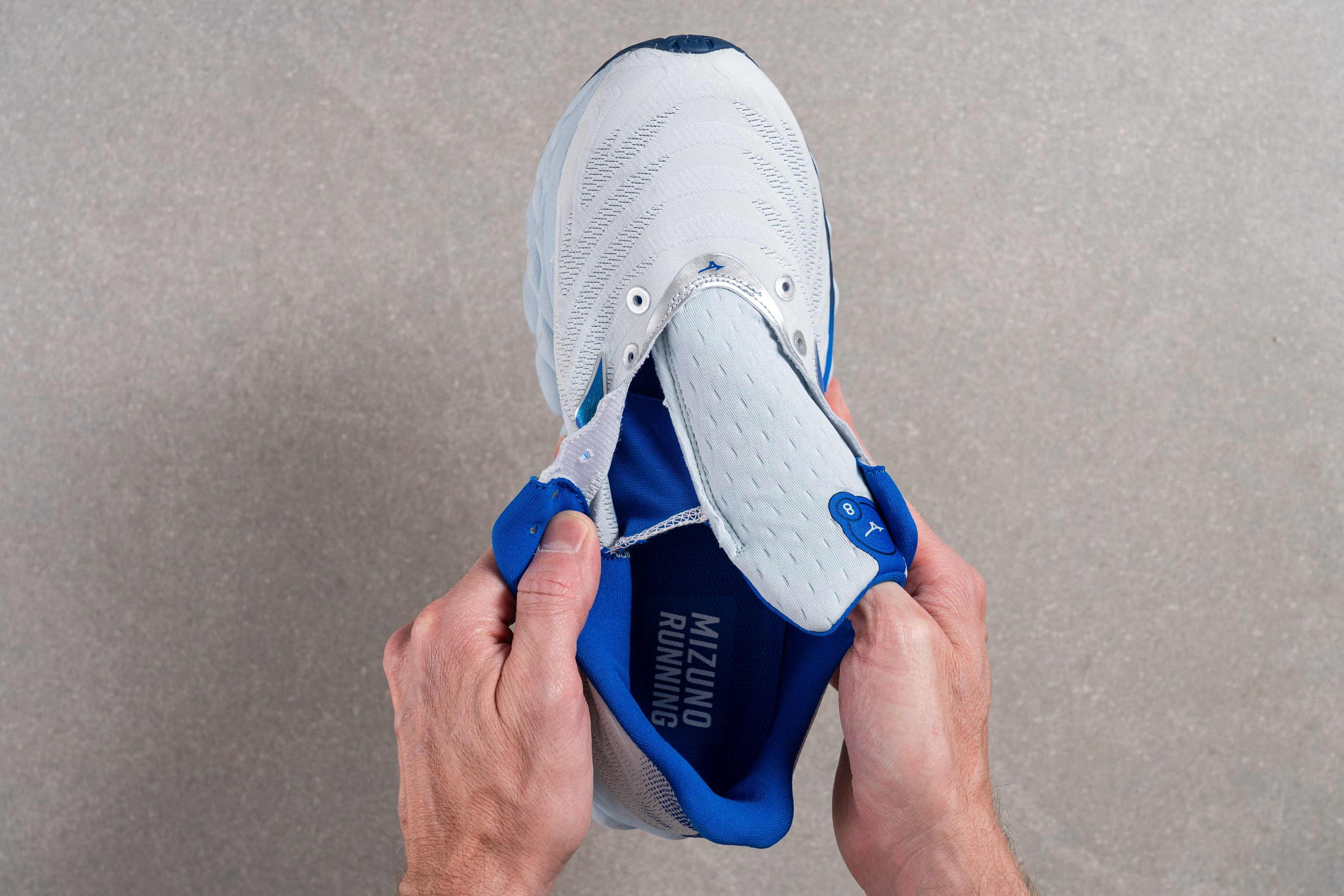
| Wave Sky 8 | Both sides (semi) |
Heel tab
The WS8 features an extended heel collar, which not only supports the Achilles tendon but also simplifies the process of slipping your foot into the shoe.
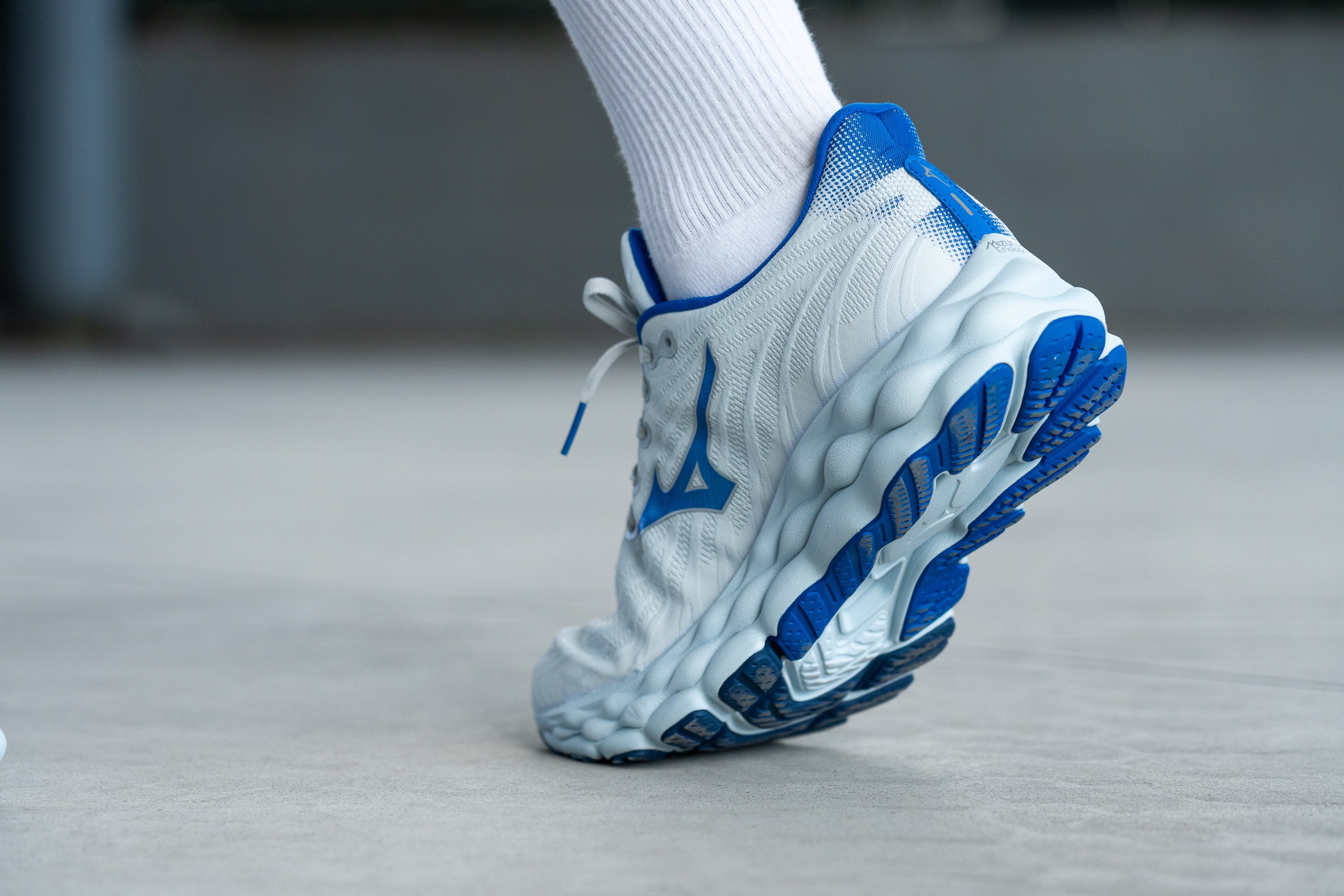
| Wave Sky 8 | Extended heel collar |
Price
The Wave Sky 8 stands as the flagship among Mizuno's lineup of daily running shoes, clearly marked at a higher price point than models like the Wave Rider 27, although it offers superior midsole and top-quality materials. On the flip side, we also believe that when compared to daily trainers from other brands, it might be priced slightly higher than expected.
| Wave Sky 8 | $170 |
| Average | $153 |

